
Around the Bar: The Specialty of Elder Law: The Myths and the Realities . . . Page 9 Schooled in Ethics: Legal Ethics Issues Involving Artificial Intelligence Continue to Emerge . . . Page 19 A Monthly Publication of the Knoxville Bar Association | March 2024
TAX
MOORE V. UNITED STATES: NAVIGATING CONGRESS’S POWER TO
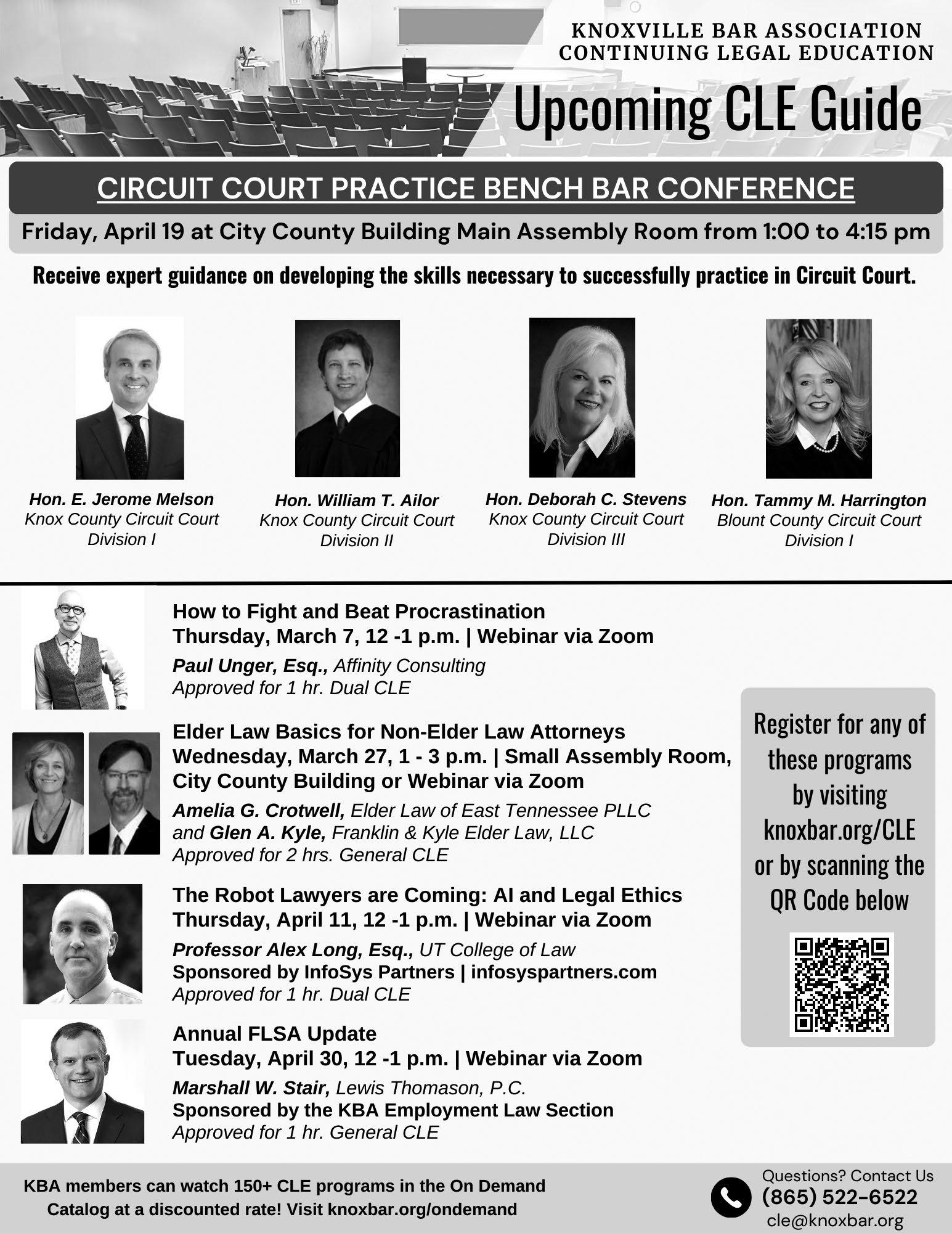
2 March 2024 DICTA
Officers of the Knoxville Bar Association
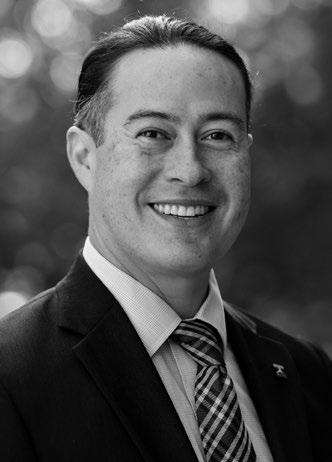
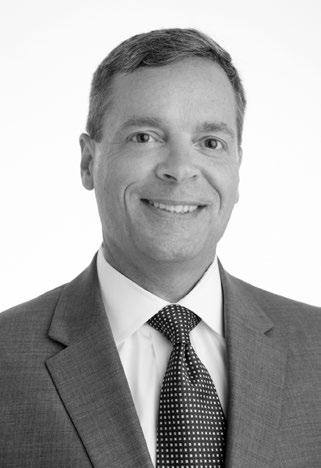
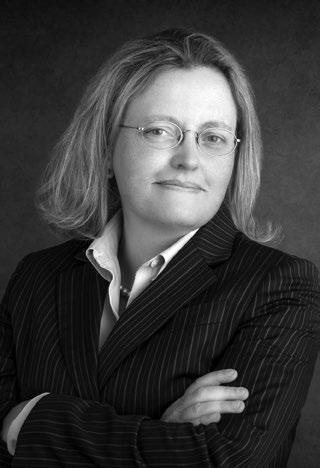
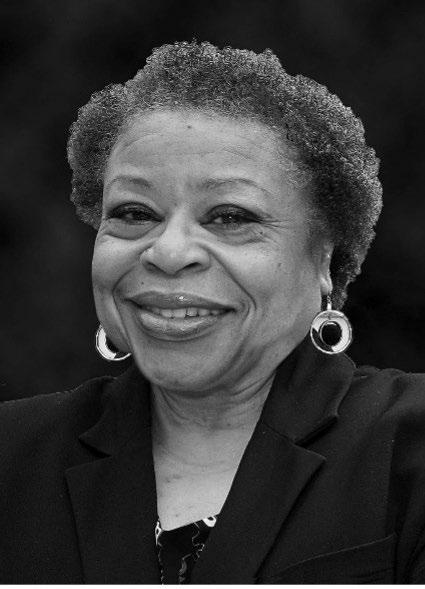

KBA Board of Governors
Melissa B. Carrasco
Joan M. Heminway
Ian P. Hennessey
William A. Mynatt, Jr.
The

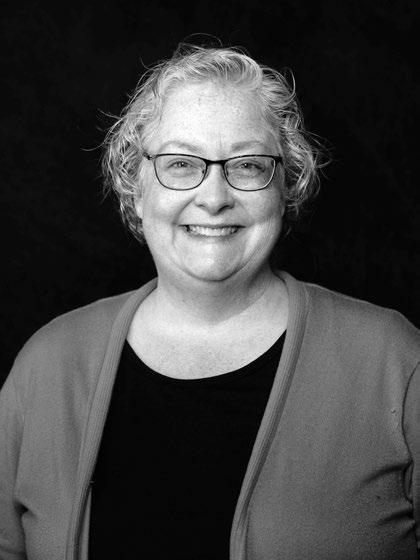
T. Mitchell Panter
M. Samantha Parris
Courtney Epps Read
Vanessa Samano
Charles S.J. Sharrett
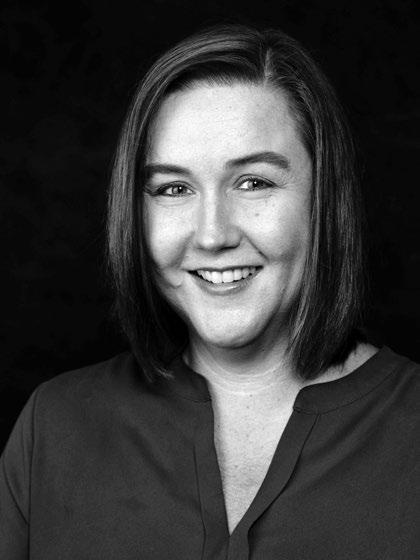
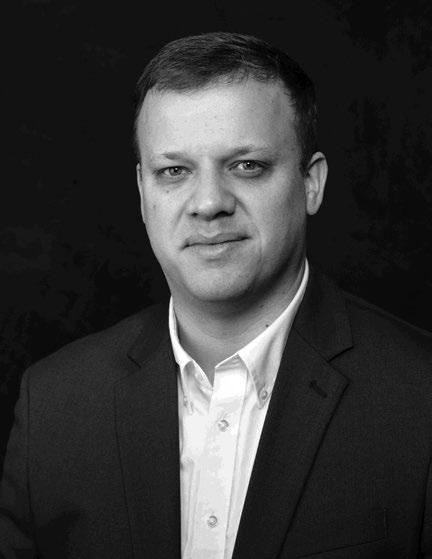

Dicta
DICTA is published monthly (except July) by the Knoxville Bar Association. It is designed to offer information of value to members of the local bar association. The news and features should illustrate the issues affecting the bar and its members. The opinions expressed do not necessarily represent those of the Knoxville Bar Association.
All articles submitted for publication in DICTA must be submitted in writing and in electronic format (via e-mail attachment). Exceptions to this policy must be cleared by KBA Executive Director Tasha Blakney (522-6522).
James T. Snodgrass
James R. Stovall
Alicia J. Teubert
Hon. Zachary R. Walden
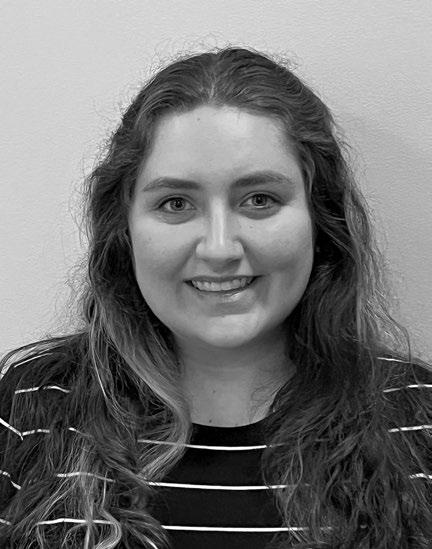
Publications Committee
Executive Editor Cathy Shuck
Executive Editor Sarah Booher
Executive Editor Melissa B. Carrasco
Brandon Allen
Anita D’Souza
Elizabeth B. Ford
Jennifer Franklyn
Joseph G. Jarret
F. Regina Koho
Matthew R. Lyon
Robin McMillan
Angelia Morie Nystrom
Katheryn Murray Ogle
Laura Reagan
Ann C. Short
Eddy Smith
Williamson
Managing Editor Tasha C. Blakney
KBA Executive Director
DICTA March 2024 3
Issue 3 Dicta is the official publication of the Knoxville
Grant
Volume 52,
Bar Association
Knoxville Bar Association Staff
Tasha C. Blakney Executive Director
Tracy Chain LRIS Administrator
Knoxville Bar Association 505 Main Street Suite 50 Knoxville, TN 37902 865-522-6522 Fax: 865-523-5662 www.knoxbar.org In This Issue March 2024 16 Moore v. United States: Navigating Congress’s Power to Tax 5 President’s Message Of Power and Opportunity 6 Practice Tips Legal Greats 11 Legal Update What’s it to You? The Enduring Question of Standing in “Reservation Rule” Cases 19 Schooled in Ethics Legal Ethics Issues Involving Artificial Intelligence Continue to Emerge 25 Management Counsel Revising Cravath 7 Attorney Profile Hon. Joe D. Duncan 9 Around the Bar The Specialty of Elder Law: The Myths and the Realities 12 What I Learned about Inclusion and Why It Matters We Are Lawyers 13 The Oath Stayed 14 Hello My Name Is Brendan Walsh 15 Privileged to Be a Lawyer “Big John’s” Example of the Citizen Lawyer 18 In Limine: Profiling Future JDs Corey Lee 21 Of Local Lore & Lawyers A Capital Breakfast 22 Top Ten List Songs for Embarrassing Your Kids in the Car 23 Outside My Window Making Coffee 24 How to Thrive in Law & Life Well-Being Strategies to Boost Mood and Reduce Depression 27 Legal Libations Alliance Brewing Company 29 Well Read Twilight of Democracy: The Seductive Lure of Authoritarianism, by Anne Applebaum 31 Tell Me a Story What Do You Do? 4 Section Notices/Event Calendar 20 Barrister Bullets 20 Welcome New Members 28 Change of Addresses 28 Bench & Bar in the News 30 Pro Bono Project COVER STORY CRITICAL FOCUS WISDOM COMMON GROUND President Carlos A. Yunsan President Elect Jonathan Cooper Treasurer Rachel Park Hurt Secretary Ursula Bailey Immediate Past President Loretta G. Cravens
Jason Galvas LRIS Assistant
Tammy Sharpe Director of CLE &
Section
Programming
Membership Coordinator Bridgette Fly Programs & Communications Coordinator
Jonathan
Guess
SECTION NOTICES & EVENT CALENDAR
Section Notices
There is no additional charge for membership in any section, but in order to participate, your membership in the KBA must be current. To have your name added to the section list, please contact the KBA office at 522-6522.
Alternative Dispute Resolution Section
The ADR Section plans regular CLE throughout the year. If you have a CLE program topic or speaker suggestions, please contact the ADR Section Chairs Joe Jarret (566-5393) or Betsy Meadows (540-8777).
Bankruptcy Law Section
The Bankruptcy Section plans CLE programs and helps coordinate volunteers for the Pro Bono Debt Relief Clinics. The next Pro Bono Debt Relief Clinic will be held on May 4, and volunteer registration is available at www.knoxbar.org. If you have a CLE program topic or speaker suggestions, please contact the Bankruptcy Section Chairs Greg Logue (215-1000), Kevin Newton (588-5111) or Shanna Fuller Veach (545-4284).
Corporate Counsel
The Corporate Counsel Section provides attorneys employed by a corporation or who limit their practice to direct representation of corporations with an opportunity to meet regularly and exchange ideas on issues of common concern. If you would like to know how you can get involved or have suggestions for CLE topics, please contact Section Chairs David Headrick (363-9181) or Marcia Kilby (362-1391).
Criminal Justice
The KBA Criminal Justice Section represents all attorneys and judges who participate in the criminal justice system in Knox County. If you have suggestions for CLE topics, please contact Section Chairs Joshua Hedrick (524-8106) or Sarah Keith (457-5640).
Employment Law
The Employment Law Section is intended for management and plaintiffs’ counsel, in addition to in-house and government attorneys. Join the Employment Law Section for the “Annual FLSA Update” CLE program scheduled for April 30. If you have a program topic or speaker suggestions, please contact the Employment Law Section Chairs Howard Jackson (546-1000) or Tim Roberto (691-2777).
Environmental Law
The Environmental Law Section provides a forum for lawyers from a variety of backgrounds, including government, corporate in-house, and private firm counsel. If you have suggestions for CLE topics, please contact Section Chairs Catherine Anglin (804-3741), Kendra Mansur (771-7192), or Jimmy Wright (637-3531).
Family Law Section
The Family Law Section has speakers on family law topics or provides the opportunity to discuss issues relevant to family law practice. If you are interested in getting involved or have suggestions for CLE topics, contact Section Chairs Blair Kennedy (539-3515) or Laura Wyrick (297-5511).
Government & Public Service Lawyers Section
The Government & Public Service Lawyers Section is open to all lawyers employed by any governmental entity, state, federal, or local, including judicial clerks and attorneys with legal service agencies. If you are interested in getting involved or have suggestions for CLE topics, contact Section Chairs Ron Mills (215-2050) or Mitchell Panter (545-4167).
Juvenile Court & Child Justice Section
The Juvenile Court & Child Justice Section has speakers on juvenile law topics or provides the opportunity to discuss issues relevant to juvenile law practice. If you have suggestions for CLE topics, please contact Section Chairs Justin Pruitt (215-6440) or Mike Stanuszek (766-4170).
New Lawyers Section
The New Lawyers Section is for attorneys within their first three years of practice, and any KBA member licensed since 2022 will automatically be opted-in to the section. If you want to participate in planning section activities, please contact Section Chairs Dalton Howard (546-0500) or Mari Jasa (546-7770).
Senior Section
The Senior Section schedules a luncheon with a guest speaker every quarter. If you have suggestions for luncheon speakers, please contact Chair Wayne Kline at (292-2307) or Sam Rutherford (659-3833).
Solo Practitioner & Small Firm Section
The goal of the Solo Practitioner & Small Firm Section is to provide and encourage networking opportunities and offer high quality CLE programs featuring topics that will help solo/small firm attorneys enhance and improve their practices and assist them with law office management challenges. If you have a program topic or speaker suggestions, please contact Section Chairs Tim Grandchamp (392-5936), Brittany Dykes (214-7869) or Stan Young (209-8034).
4 March 2024 DICTA
event calendar Check the KBA Events Calendar at www.knoxbar.org for scheduling updates. March 7 Law Practice Today Webinar 8 Family Law Section Social 12 Professionalism Committee 12 Access to Justice Committee 13 Veterans Legal Advice Clinic 13 Barristers Meeting 14 Judicial Committee Meeting 26 CLE Committee 27 Elder Law CLE 27 Board of Governors Meeting 25 Law Practice Today Webinar April 1-5 The KBA Goes to Panama! 9 Professionalism Committee Meeting 10 Veterans Legal Advice Clinic 11 Law Practice Today Webinar 11 Judicial Committee Meeting 12 KBA Book Club 16 LRIS Committee Meeting 19 Circuit Court Bench Bar Conference 24 Board of Governors Meeting 30 Annual FLSA Update Webinar n n n n n n n n n n n n n n n n n n n n n SAVE THE DATE: KBA Annual Law Day Luncheon Hilton Knoxville May 1
PRESIDENT’S MESSAGE
By: Carlos A. Yunsan University of Tennessee College of Law
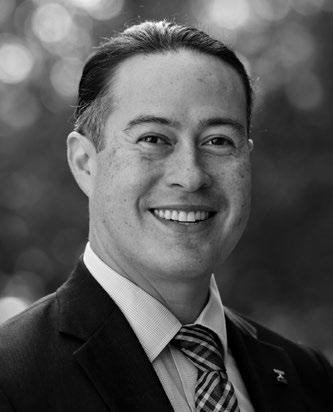
OF POWER AND OPPORTUNITY
Without a doubt, my kids know it. If you have been around me long enough, you probably know it, too: I am a sucker for fictional heroes! Yes, I do know they are the figment of someone’s imagination and that their origin stories and heroic tales are fantasy. But, nonetheless, they inspire me and help me visualize some of the values I want to embody. Take Luke Skywalker and Peter Parker (Spiderman) for example. They possess great abilities that make them game changers. Those around them look to them to tackle impossible tasks—and trust them to save the day. And yet, it is not the power gained from learning to master the ways of the Force or from the unexpected bite of a radioactive spider that capture my heart and mind. Now, don’t get me wrong. Those are super cool, and I would gladly welcome them, especially if I get to wield a lightsaber or develop Spidey sense! For me, however, it’s all about how Luke and Peter time and again choose to use their abilities for the greater good—and often at a great personal cost.
Surely by now you know where I am going with this. You are, after all, highly trained professionals in the great mysteries of logic and reasoning and in the high arts of wielding words to make others see things your way (otherwise known as persuasion). These are just two of the many powers an attorney possesses. In and of themselves, they are awesome and desirable. But, when harnessed with purpose, passion, and skill, they can change someone’s life. Indeed, they can strengthen the fabric of a community and even bind together an entire nation.
Uncle Ben summarized it best, as he gently admonished Peter on the use of his amazing abilities. “With great power comes great responsibility.”1 Members of our profession, undisputedly, have been endowed with great power. The person with a broken body from a recent car wreck knows it. The tenant who is getting evicted and the criminal defendant know it, too. And so does the nonprofit, small business, or governmental body that asks for your assistance. Responsibility is inherent to our profession as much as power is. But bearing responsibility can feel at times, if not often (let’s be real), quite burdensome. So let me reframe and offer a small tweak to Uncle Ben’s maxim: “With great power comes great opportunities.”
I am grateful that I have nothing remotely close to Luke’s or Peter’s powers. Those really seem to be inextricably linked to great responsibility—likely more than I care to bear. I am also grateful to be an attorney with the prerogative to use the abilities I do have to serve and make a difference, in the same way that so many other members of this bar have set an example for me to follow. I think of Jason Long donating his time to serve for a season as an adjunct professor, passing along his rather advanced writing skills to future lawyers (including this one); of
past bar presidents Hanson Tipton and Cheryl Rice never wasting an opportunity to encourage and communicate vision to a new bar leader who had no clue what he was getting into; of Justice Sharon Lee and Judge Kristi Davis sharing their wisdom and judicial acumen and using their power to open the doors for bar service, to name a few. That’s the amazing thing. We need no fictional or superhuman powers to serve and make a difference. What we already have is sufficient.
I am proud to be a member of the Knoxville Bar Association, which is—at its core—a service endeavor. Staff and volunteer attorneys meticulously select and secure speakers who can deliver relevant continuing legal education programs, like the “The Robot Lawyers are Coming: Artificial Intelligence and Legal Ethics” CLE program on April 11. They find venues and plan engaging social events that bring us together, such as the Family Law Section Social on March 8. Our collective service, however, goes beyond the Knoxville bar and impacts the profession across the state. The work of the Professionalism Committee led by Chancellor John Weaver and attorney James Stovall2 is a case in point. In fact, in an order dated January 12, 2024, the Tennessee Supreme Court expressly recognized comments submitted by the KBA (i.e., recommendations from the Committee) in “declin[ing] to adopt the proposed amendments . . . to Tennessee Supreme Court Rule 9, section 16.”3
Moreover, the KBA leverages its power not only in service of its members but also in service of the public in need of legal services. Last month alone, in collaboration with community partners: our Bankruptcy Section spearheaded a (Saturday) Debt Relief Clinic at the Knox County Public Defender’s Community Law Office on February 3. The following weekend, the Access to Justice Committee offered a Faith & Justice Clinic at The Church of Jesus Christ of Latter-Day Saints at 400 Kendall Road. And, on that most revered of days—Valentine’s Day, of course— the ever-busy Barristers secured attorneys and law students to provide a legal advice clinic for Veterans.
Opportunities to leverage our power as attorneys, in deference to the concomitant responsibility to serve, abound. The KBA is here to get you connected. An opportunity to use your powers awaits!
1 This quote’s origin has been variously attributed to French writer and philosopher Voltaire, Winston Churchill, and the Bible (“To whom much is given, much will be expected.”), among other sources.
2 Mr. Stovall, sensing another opportunity to use his powers, agreed to be a candidate for and was elected to serve a three-year term on Board of Governors at the annual meeting last December.
3 Rule 9, section 16, sets forth the procedure for handling complaints against members of the Tennessee Board of Professional Responsibility, District Committee Members, and Disciplinary Counsel. See Tenn. Sup. Ct. R. 9, § 16.
DICTA March 2024 5
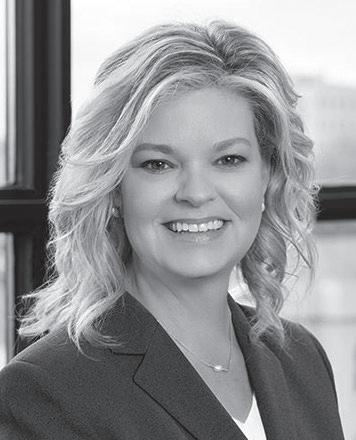
PRACTICE TIPS
By: Janet Strevel Hayes Lewis Thomason
LEGAL GREATS
“Preserving Issues for Appeal” - That was the topic I intended to cover for this month’s Practice Tips. Rooted in rules and guidelines, the topic lent itself to compartmentalized bullet points with “tips” for the savvy practitioner of the law. Arguably, it would have been perfect for this column. But as I began writing, I was haunted by the reality that ChatGPT could probably generate those same tips. After all, it was about this time last year when AI passed the bar exam.
I then began pondering (squirrel!) whether there are “practice tips” that transcend a computer’s legal ability. And just like that, my mind (and therefore this column) spiraled into a reflection on the tips that have been most meaningful in my practice. My new working theory is that a computer may be a “good” practitioner of the law, but elements of humanity are required to move from “good” to “great.” Below are some of the real practice tips I learned from the “greats” I have encountered along the way. And, at least for now, these tips can’t be fully replicated by artificial intelligence:
Creativity: As a baby lawyer, I watched John King and Dick Krieg begin the defense of any given case by covering tables with books and researching the law. But learning/confirming the applicable statues and case law was merely a launch point. The magic happened afterward – as they pontificated, debated, and ultimately created unique arguments and strategies to wrap those legal protections around the specific facts presented by their clients. It was more art than science – an approach that forced consideration of human reactions and human emotions. They demonstrated that the law is not always where the argument ends, but it may be just where the argument begins. Through their creativity, they opened the door for new thoughts and ideas. Tip #1: Good lawyers learn the law and follow it while great lawyers learn the law and lead it.
Cognizance: Dennis Jarvis was one of the greatest gentlemen of the law I ever knew. He differentiated himself with his kind demeanor and his intrinsic ability to hear what was not said. Ever present and ever aware, he noted once that lawyers tend to overlook the obvious. For example, he once advised me: “Look at the deponent’s hands during a personal injury deposition – were they calloused? Had he been working?” Dennis also demonstrated the art of disarming congeniality. I watched him argue the intricacies of a complex statute with a judge and immediately exit the courtroom to have an equally passionate exchange with a janitor about Grainger County tomatoes. It is impossible to measure the impact of his ability to recognize his surroundings and graciously adapt, but I would argue it was a quiet skill that undergirded his tremendous success. Tip #2: Good lawyers strive to stand out, but great lawyers excel by fitting in.
Concern: Lawyers are called counselors for a reason. While trained to argue positions, great lawyers answer a calling to give advice. Perhaps none was better than East Tennessee legend, Don Paine. While his knowledge of the rules of evidence was incredibly impressive, the personal concern he showed for those around him is his legacy. As a young lawyer, I (like many others who will read this) called him frequently with questions about law and life. Despite his demanding schedule, he always dropped everything and led me to believe he had just been waiting for my call. He cared, and his concern for his clients and others in the legal community set an example that elevated our local bar. Tip #3: Good
lawyers tell you what they know while great lawyers show you that they care.
Contentment: Practicing law can be grueling, heartbreaking, and demoralizing. So many of us are prone to fixate on those negatives. Not Linda Mowles. If you ever had a case with her, you know she had a brilliant legal mind and fought zealously for her clients. But Linda never let the demands of her practice eclipse her joy in life. Defeats were opportunities to learn and improve. Mistakes were simply obstacles to overcome. In a culture of ruthless hurry, she was steadfast and methodical. Perhaps she was stronger because she never limited her selfdefinition to her legal accomplishments. Watching her, I observed that the ability to be calm in the midst of the storm is, in a strange way, a legal superpower. Tip #4: Good lawyers try to calm the storm, but great lawyers are the calm in the storm.
So, if you want a refresher on “preserving issues on appeal,” I bet your computer can give you some semi-reliable guidance and generate a great checklist. Look there. But if you want real tips on improving your practice, look around our bar. Legal greats blazed this trail we are walking, and some legal greats currently walk alongside us. I am convinced they are the ones who can teach us the most.

6 March 2024 DICTA
ATTORNEY PROFILE
By: Gary R. Wade Tennessee Supreme Court Justice, Retired
HON. JOE D. DUNCAN
Joe Duncan, revered as a trial judge for the Knox County Criminal Court from 1966 to 1975 and as an appellate judge for the Tennessee Court of Criminal Appeals from 1975 to 1990, celebrated his 100th birthday on February 11 of this year. Remarkably spry of mind and with a body holding its own, he is still the master storyteller, especially of his days on the trial bench, and some at the expense of his beloved bailiff Sheeny White. Lawyers during his days on the trial bench, now long of tooth or moved on to their greater reward, were brand new to the profession during Joe’s term, and included such notables as Bob Ritchie, Bernie Bernstein, Rex McGhee, Zane Daniel, Joe Tipton, Herb Moncier, Ralph Harwell, James A.H. Bell, Randy Nichols, Charles Susano, John Gill, Charles Fels, Tom Dillard, even the legendary Ray Jenkins, and so many others who practiced criminal defense and toiled under his tutelage -- some for the prosecution, some for the defense, and some (like Nichols, McGhee, and Daniel) who served in both roles.
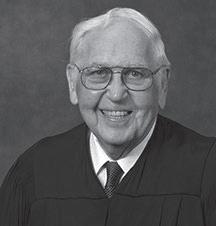
Gill, who later served as United States attorney, called “Joe D.” the best criminal court judge he ever faced, certainly knowledgeable, and, of greater importance, always treating both sides with dignity, courtesy, and respect. While once complimenting then judge and now former congressman Jimmy Duncan for his work on the bench, Gill conceded that as good as he was, his Uncle Joe was the best. For his part, Judge Jimmy acknowledged that in his early years on the bench when he had to make a ruling on a legal question, he would take a recess and give Joe a telephone call. Tipton, who was appointed to succeed Judge Duncan after his retirement from the Court of Criminal Appeals, echoed Gill’s sentiments, saying, “It was my highest honor to take the seat of such a respected jurist.”
After my appointment to the Court of Criminal Appeals in 1987, Joe was elected Presiding Judge of the nine jurists on the court. I used to say that the highlight of each day for me was lunchtime with judges Joe D., John Byers, and Houston Goddard, who regaled any and all assembled by their often-embellished experiences in the courtroom. While there is not enough space in this month’s DICTA for all of the tall tales, maybe the editor will consent to two of Joe’s favorites about his bailiff. It seems that after a long sentencing hearing, Joe took a recess to determine whether or not the defendant qualified for probation. As he considered the matter, Sheeny, standing in the hallway and unaware that his judge was within earshot, was asked by an interested lawyer if a decision had been made, “No,” he responded. “It may be a while before old wishy-washy makes up his mind.” In another hotly contested case, apparently with complex legal issues, several witnesses were called to the stand. In each instance, Sheeny would stand and summon each witness. Between witnesses, however, he would doze off. When the trial ended, Judge Duncan remarked, “It would take the wisdom of Solomon to
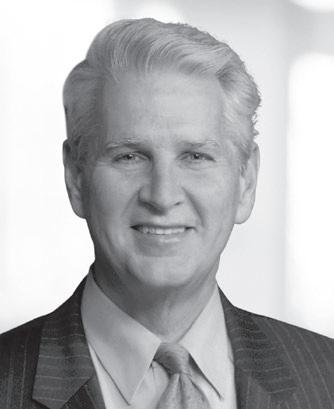
decide this case.” Hearing the word Soloman, Sheeny jumped to his feet and loudly summoned “Mr. Solomon, Mr. Solomon!” When no one in the courtroom answered, he walked into the hall and repeated his call. When there was no response, the bailiff returned to the courtroom, which was filled with a packed audience, and meekly announced to his judge that Mr. Solomon did not answer. An onlooker quoted Judge Duncan’s response. “No, Mr. Bailiff, and he has not been here for the last five thousand years!”
As a trial judge, no one did it better than Joe Duncan. His work ethic was a quality he brought to the appellate court system. Throughout his tenure he read every one of the opinions by his colleagues, identified the issues, and kept a numbered card system -- way before computers -- in an effort to assure consistency in the thousands of decisions by the court. Will Rogers said that he never met a man he didn’t like. I never met any man or woman in the profession who did not love -- and respect--Joe D.
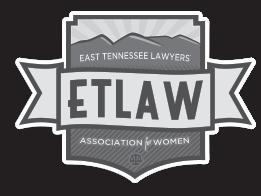
ETLAW is a professional legal organization that fosters personal and professional development and works to advance women in the legal profession and in society as a whole.
We are so grateful for 40 years of support from the Knox area bar! We invite you to join us or renew by scanning the QR code below or visiting our website at www.etlawtn.org.
DICTA March 2024 7

8 March 2024 DICTA
AROUND THE BAR
By: Kelly Frere Certified Elder Law Attorney Council of Advanced Practitioners Guyton & Frere
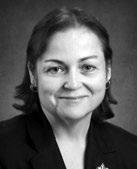
THE SPECIALTY OF ELDER LAW: THE MYTHS AND THE REALITIES
This article is not intended to be a solicitation- at least not for your business or the business of your clients. It is intended to pique your interest, dispel some myths, and perhaps entice you to consider the practice of elder law.
A little history: In the late 1980s, it just so happened that the law firm of Guyton & Frere and the National Academy of Elder Law Attorneys (NAELA) were both formed. After attending an early NAELA Institute in Texas in 1991, my mother, Arline Guyton, my husband, Matt Frere, and I decided that this specialty was going to be our future. In 1992, the National Elder Law Foundation (NELF) was formed to be the branch that certifies elder law practitioners as specialists; however, it took the ABA, and thereafter each state, to acknowledge the specific requirements for specialization and to allow attorneys to become certified elder law attorneys (CELA). Tennessee accepted the CELA designation in 1998. In 2003 NAELA was expanded to include special needs planning for persons with disabilities.
In 2003, NAELA had 4,500 members, and within that number were about 450 attorneys reaching certification. There was much excitement and enthusiasm that the often-unique needs of seniors and persons with a disability would be addressed by attorneys who poured themselves into the specialty.
So, what’s the problem? Why am I bringing the possibility of this specialty to your attention? You think you know us, but over and over again we hear myths spoken by practitioners in other areas about what we do, who we represent, and how we make a living doing it. Those myths are most likely why our NAELA membership remains at 4,200 and CELAs nationwide number only 515. Of most concern is that just a glance around a NAELA conference confirms the suspicion that CELAs are aging out.
Myth: We only represent old people.
Our youngest client to date was three years old, and our oldest was 103. While it is true that our specialty was created to address the needs of senior citizens, it’s important to remember that we also represent people with a disability. (Our three year old client was the recipient of settlement funds coming from an injury received during the birth process. We were brought into the case at just the correct time: when the amount of settlement had been reached but the terms for where to place and manage the funds going forward were in the drafting stage.) Addressing the long-term care needs of a person with a disability most often means creating, funding, and defining allowable uses of a Special Needs Trust. It also requires understanding the different types of Special Needs Trusts and what types meet the needs of the person with a disability as well as other family members who may play a role in the ongoing care of the trust recipient.
Myth: The elderly are difficult clients.
Seniors are wonderful clients! They rarely forget an appointment and are usually early. They always pay their legal fees. They often belong to clubs and support groups and attend social gatherings and community
events where they learn to navigate federal and state agencies – at least to the point where they learn to seek legal advice most aligned to their particular issues. The majority of seniors are genuinely appreciative of the guidance and options an elder law attorney can give them – even if the answers are not what they wanted to hear.
Myth: Elder Law Attorneys are social workers who don’t make any money.
I’ve never understood the presumption that because a person is older that they no longer have any money. While it is true that long-term care can be expensive, that buying anything these days generally costs more, and that adult children are burdening their parents by remaining in the home, there are a lot of people in this country who have saved their money, spent wisely, avoided debt, and carved out a nice little corner of the world for themselves. When they need assistance from their attorney for quality services rendered, the attorney gets paid. Add to that the fact that we rarely have lengthy adversarial litigation, that our clients like to bring us cookies and other little treats, and that clients always need an extra few minutes to play with our office dog . . . well, it’s a pretty great way to practice law.
Myth: You get your new clients from your former clients.
First, the word “former” (inferring that they are a client no more) to identify or categorize our clients is not an appropriate term to use in our world. There are the rare occasions when someone counsels with one of our attorneys for an hour, is satisfied with a few specific answers, and then leaves never to be seen again. A few may just come in for a Limited Power of Attorney, for a review of a pending real property transaction to make sure government benefits are not at risk, or to obtain a very simple Qualified Income Trust. And even though the asset regulations for means-tested benefits are gradually becoming more generous for a person applying for Medicaid (TennCare in Tennessee), many of our clients only see themselves walking down a fiery course with no safe or even comfortable resolution in sight. Once a client comes to you for information, representation, documents, and/or assistance with government forms and processes, they usually hang around as clients until they die – and, often, throughout the estate administration (or trust) processes.
Second, many of our clients are referred to us by tax advisors, financial planners, officers in financial institutions, directors in medical and long term care facilities, directors of agencies that serve the needs of the elderly and disabled populations, directors of area offices on aging, funeral directors, and attorneys who practice in other specialties. It is not unusual for attorneys who practice real estate, family law, bankruptcy, “traditional” estate planning and estate administration, and personal injury matters to contact us for assistance. In many of those cases, we step in to assist with the possible TennCare, special needs, or long term needs of the client, and then step away from the case. It has always been our policy that we help other attorneys help their clients – we do not steal their clients from them. We have been “called” into one case
continued on page 26
DICTA March 2024 9
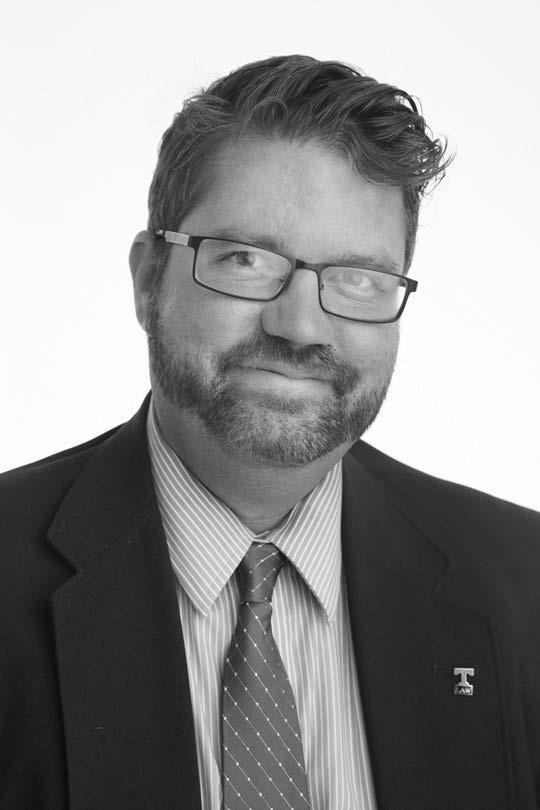
Most domestic relations cases are $250/hour. However, I’m looking to expand my mediation practice into personal injury. Therefore, through the end of June, 2024, all personal injury mediations are just $200/hour. Also, as always, indigent parents pay no mediator fees for child custody or visitation cases. That’s right, it’s absolutely free!
*Based
10 March 2024 DICTA Vol Mediation Services (865) 206-8839
J. Stanuszek,
is
Over 300 Mediations, a 92.62% settlement rate, and the ability to meet in-person or via Zoom.* Mediations may be booked IMMEDIATELY using our website in four or eight-hour blocks, with most mediations confirmed within 24 hours of booking.
Volunteer Mediation Services 800 S. Gay St., Suite 700 Knoxville, TN 37929 Ph: (865) 206-8839 FAX: (865) 381-1340 mstanuszekesq@gmail.com
Michael
Esq.
a Tennessee Supreme Court Rule 31 listed mediator in both general civil and family law. He has been designated by the Tennessee Supreme Court as Specially Trained in Domestic Violence Issues. In addition, he has 20 years of experience litigating personal injury and domestic relations cases in East Tennessee.
www.VolMediation.com
on mediations through February 1, 2024, and includes cases where all or part of the outstanding issues were resolved at mediation. As with everything, past performance does not guarantee future results.
By: John E. Pevy Tennessee Valley Authority Office of the General Counsel

WHAT’S IT TO YOU? THE ENDURING QUESTION OF STANDING IN “RESERVATION RULE” CASES
The Americans with Disabilities Act (the ADA) and the “Reservation Rule”
In 1990, Congress enacted the ADA, closing a gap of protected civil liberties left open by the 1964 Civil Rights Act and the 1965 Voting Rights Act,1 those for individuals with disabilities.2 As part of this legislation, the Department of Justice issued a regulation known as the “Reservation Rule,” which mandates that a hotel’s reservation listing must “identify and describe accessible features” sufficiently for disabled individuals to gauge if the hotel can satisfactorily accommodate them.3 In 1982, the Supreme Court issued a seminal decision in Havens Realty Corp. v. Coleman that “testers” (private citizens investigating whether businesses are complying with accessibility standards) have standing to sue businesses for failure to comply with ADA requirements.4 Over time, private litigants filing suit has become the primary manner for enforcing ADA statutes and regulations like the Reservation Rule.5
Between 2018 and 2022, plaintiffs filed an average of 10,468 ADA lawsuits per year against private businesses in the United States,6 with the right to public accommodations for persons with disabilities disputed in many of them.7 Some plaintiffs like Laufer have become heroes in the disabled community, and pariahs in the business world, for their abundant case filings.8
Acheson Hotels and the Question of Standing
The case of Acheson Hotels, LLC v. Laufer offered the United States Supreme Court the opportunity to determine whether some of the plaintiffs filing these cases lacked the requisite standing to pursue them.9 However, it also presented the Court with a choice: tackle the difficult and impactful procedural question of whether or not disability “testers” possessed standing to sue places of accommodation under the ADA’s “Reservation Rule” for failure to adequately advertise accessible rooms when the tester never intended to visit the business, or opt for a much easier procedural ruling that this individual case had been rendered moot by Laufer’s actions in lower courts.10
The Court chose the latter option, leaving the state of the law—and potential litigants—in limbo.
Background Leading Up to Supreme Court’s Decision Not to Review
The procedural and contextual machinations engineering the Supreme Court’s decision in this case bear discussion. Prior to Acheson Hotels’ decision to fight Laufer all the way to the nation’s highest court, she was already a prominent Reservation Rule “tester” litigant. The Court’s majority opinion notes that “Laufer has singlehandedly generated a circuit split” on whether she has standing to bring tester cases.11 With this level of commitment to pursuing tester cases, it’s no surprise that Laufer only agreed to voluntarily dismiss her suit against Acheson Hotels after she and her associated counsel in a separate Reservation Rule case encountered some hot water.12 The U.S. District Court for the District of Maryland suspended her attorney after receiving a report detailing unethical billing practices and potential misuse of funds.13 Whether it impacted her decision or not, it is noteworthy that the sanctions imposed upon Laufer’s counsel in the Maryland case also implicated her attorney
in Acheson Hotels 14 Given these serious questions of impropriety on the part of Laufer’s counselors, she voluntarily dismissed her suit against Acheson Hotels, but not before acknowledging the Court’s authority to still resolve the lingering standing issue.15
As for this case, Laufer originally sued the Maine hotel chain based upon allegedly inadequate advertising for disability accommodations.16 However, as Acheson Hotels argued, and as Laufer admitted, she never had any intention of visiting Maine or an Acheson Hotel.17 Given this context, the majority opinion opened by stating that, “[o]nly plaintiffs who allege a concrete injury have standing to sue in federal court.”18
So, why did the Court unanimously pass on resolving a Circuit split? Per the majority opinion, despite sensitivity to Acheson Hotels’ concerns about future suits,19 the Court was “not convinced . . . that Laufer abandoned her case in an effort to evade [its] review,” and she had represented to the Court that she would not file future Reservation Rule cases.20 Whether persuasive or not, this reasoning supported a unanimous holding.
“Reservation Rule” Cases in the Future?
Where does this leave potential future litigants? Well, plaintiffs in the Second, Fifth, and Tenth Circuits will continue to encounter obstacles based upon stricter standing requirements,21 whereas, aggrieved individuals in the First, Fourth, and Eleventh Circuits can still seek redress for their alleged damages.22 Additionally, testers in the Ninth Circuit could be emboldened by the decision, as the circuit court will likely not reconsider Langer v. Kisor, a decision favorable to testers.23
The only Justices to weigh in on the merits of the standing argument were Clarence Thomas and Ketanji Brown Jackson, who espoused differing opinions in their concurrences.24 Justice Thomas opposed Laufer’s right to sue, borrowing the words of late-Justice Antonin Scalia as his guide point on whether or not a party should have standing: “‘[w] hat’s it to you?’”25 Thomas argued that Laufer lacked standing because “Acheson Hotels’ failure to provide accessibility information on its website is nothing to [her], because she disclaimed any intent to visit the hotel.”26 Jackson’s concurrence, alternatively, expressed her dissatisfaction of the Court’s vacatur of the First Circuit’s pro-tester ruling as part of its mootness holding.27
Still, the Court did unanimously hold that this matter was moot, eschewing Acheson Hotels’ fear that failing to resolve the standing debate now will only open up countless other businesses to tester cases before another dispute reaches the high court. To that point, the Court gave tepid emphasis “that we might exercise our discretion differently in a future case.”28 Until then, the Circuits will remain split, and businesses may need to monitor their advertisements lest they run afoul of an intrepid “tester.”
1 See Nora McGreevy, The ADA Was a Monumental Achievement 30 Years Ago, but the Fight for Equal Rights Continues, SmithSonian (July 24, 2020), https:// www.smithsonianmag.com/history/history-30-years-since-signing-americansdisabilities-act-180975409/.
2 Title III of the ADA prohibits discrimination “on the basis of disability in the full
continued on page 21
DICTA March 2024 11
LEGAL UPDATE
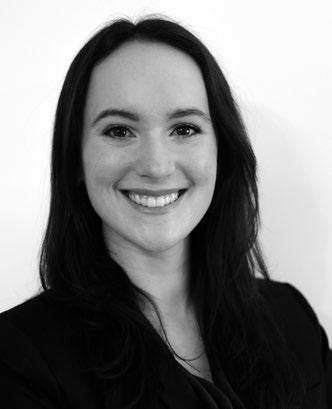
WHAT I LEARNED ABOUT INCLUSION AND WHY IT MATTERS
By: Caroline J. Rogers Law Clerk for United States Magistrate Judge Cynthia Richardson Wyrick
WE ARE LAWYERS
I never know how to introduce myself. “I’m a clerk.” “I’m a lawyer.” “I’m a law clerk.” “I work for a judge.” Regardless of how I title myself, clerking in federal magistrate court has been perhaps the most interesting and fun job I have ever had. But before starting, I did not quite know what to expect. During group information sessions with the career center at my law school, advisers told us that clerking would improve our research and writing skills, teach us how to effectively advocate from the perspective of a judge, and create lifelong professional connections with our judges and co-clerks. Ultimately, I found that all the things they told us were true.
Once I knew that I would be clerking, I began to learn more about the position by interviewing and speaking to other law clerks. However, nothing could really prepare me for the fast-paced environment that includes not only researching and writing but also serving as an administrator. I have found myself constantly asking my fellow clerks, “Have you ever seen this issue before?” The answer is often no, making the job both interesting and challenging.
When asked to write about serving as a judicial clerk in the context of diversity, equity, and inclusion, many ideas about this very important topic came to mind. However, from my perspective at this starting point in my career, I began to think about how diverse the practice of law itself can be. Specifically, I thought about the importance of respecting every lawyer’s path, whether that be working for a firm, government agency, business, or in some capacity with no readily apparent connection to
the law.
In my day-to-day, I work with career clerks who have dedicated their careers to working for judges, learning the law, and providing invaluable assistance to the court in ensuring that justice is served. While still in law school at the University of Wisconsin, I met law students who planned very different paths. One classmate planned to return to work on their family’s farm while also serving as in-house counsel. Another planned a career in accounting and took his CPA exams during breaks from law school—he may have outworked everyone in the class. Other classmates chose paths outside of the legal field altogether with one now working as a book editor. Still, many followed more traditional paths like becoming prosecutors and defense attorneys, working for civil litigation firms, or practicing transactional law. Though we have chosen divergent paths, we all benefitted from our training in the law and have been able to put that legal education to work in jobs for which we have a passion. We are writers, we are analytical thinkers, and we are persistent questioners. Importantly, regardless of our job descriptions, we are lawyers.
In thinking about diversity, equity, and inclusion in the legal field, not only is it imperative to consider and respect individual differences in perspective and life experience, but it is also important to respect the various roles in which we find ourselves. In fact, having lawyers work in such diverse roles may just help us better educate the public on the importance of our legal system and, in turn, increase the public’s respect for that system.
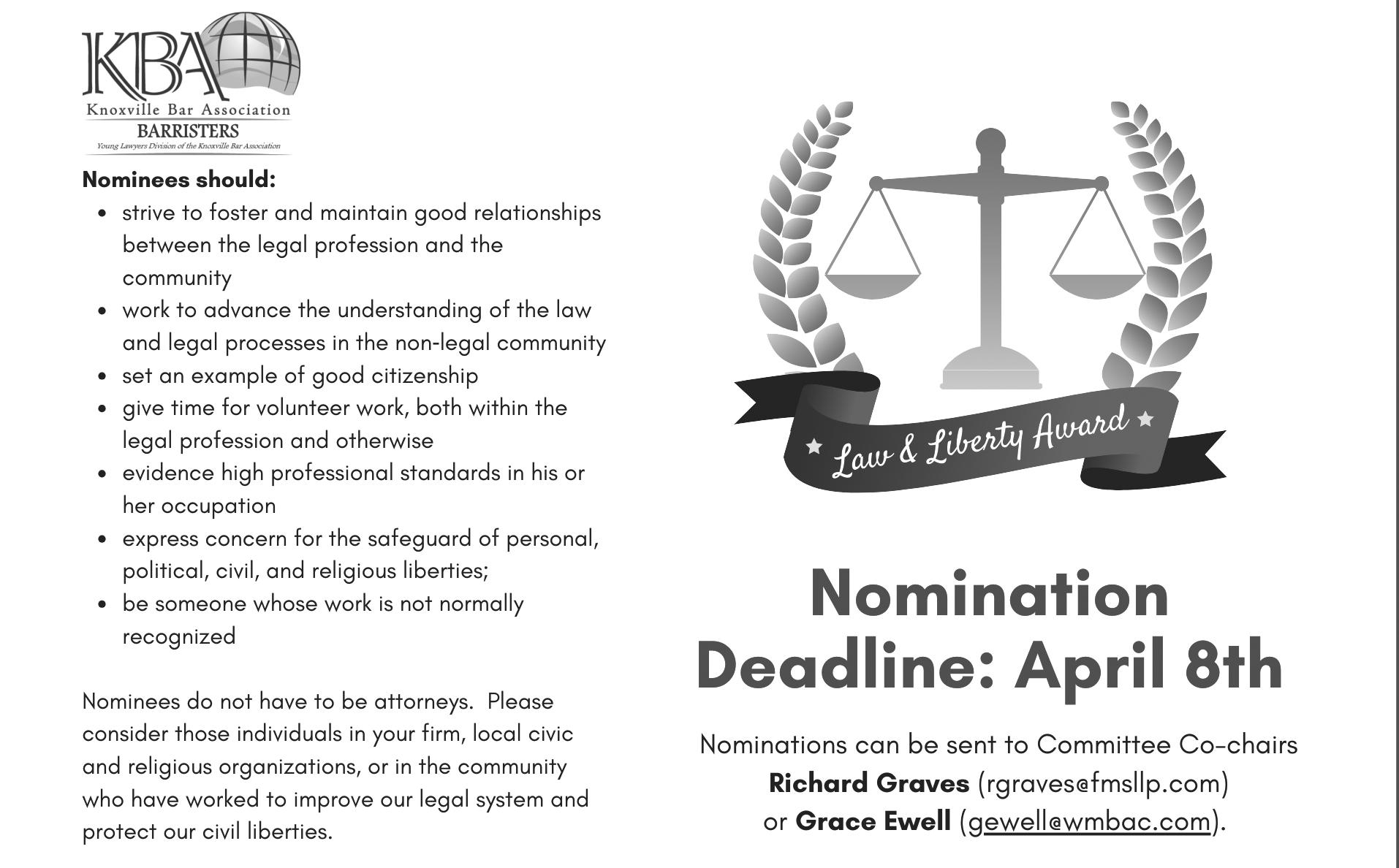
12 March 2024 DICTA
THE OATH
By: Melissa B. Carrasco Carrasco Law Group, PLLC
STAYED
Quiet. For most people, on most days, 4:30 a.m. is a quiet time. The world takes a pause before the busyness of the day starts all over again. On April 12, 1861, 4:30 a.m. was anything but quiet.
Barely a month earlier, a fifty-two-year-old lawyer stood in front of Chief Justice Roger B. Taney, placed his left hand on a Bible provided by William Thomas Carroll, then clerk of the Supreme Court, and took an oath.1 That particular Bible, borrowed from Mr. Carroll because the President-elect’s family Bible was still in storage, would resurface 148 years later at the inauguration of the 44th President.2 But, that is a story for another day.
On March 11, 1861, that young President took the Oath embedded in Article II, Section I of the U.S. Constitution.
I do solemnly swear (or affirm) that I will faithfully execute the Office of President of the United States and will to the best of my Ability, preserve, protect, and defend the Constitution of the United States.3
By the time Lincoln raised his right hand to take that Oath, seven of the 34 states had seceded; four more, including the State of Tennessee, were threatening to do so.4 Twenty-five of the 66 Senators had left the Senate.5 The Chief Justice standing in front of him was the author of the majority opinion in Dred Scott v. Sandford, 60 U.S. 393 (1857), an opinion which Lincoln publicly called erroneous, and a few other words.6 But, he raised his right hand and took the Oath anyway.
A month later, at 4:30 in the morning, the tense quiet hovering over Fort Sumter, South Carolina, was shattered by volley after volley of cannon fire.7 Less than 36 hours later, Fort Sumter surrendered. Then, four more states seceded, and the U.S. was at war with itself.8 On both sides were military personnel, elected and appointed government officials, and other civil servants who had taken the simple Oath enacted as the first Act of the first Congress: “I, A.B., do solemnly swear or affirm (as the case may be) that I will support the Constitution of the United States.”9 After April 12, 1861, “I will support the Constitution” began to take on a new meaning.
For example, after it seceded, the state of North Carolina required its soldiers and elected and appointed officials to take an Oath of Allegiance to “bear true allegiance to the State of North Carolina and to the Constitutional powers and authorities which are or may be established for the government thereof.”10 The Oath to support the Constitution was replaced by an oath to support a state.
The departures were systemic; key people were leaving key positions. Within days of the attack on Fort Sumter, 322 naval officers and enlisted men left to join the Confederacy, leaving the Washington Naval Yard very short-handed.11 Even the commanding officer of the Naval Yard— Commandant Captain Franklin Buchanan, who had already spent 45 years in Naval service—resigned his commission to join the Confederate States Navy.12
But, before he resigned, Commandant Buchanan did one, pivotal thing. He called all of the shipmen and workers at the Washington Naval Yard to assemble by the flagpole, informed them that he was resigning, asked them to remain loyal to the federal government, and commissioned Commander John Adophus Bernard Dahlgren as his successor.13
Commander Dahlgren was an interesting fellow. By that day at the flagpole, he had been an ordnance officer at the Washington Navy Yard

for almost fourteen years.14 Over the years, Dahlgren designed numerous weapons, including the boat howitzer and the Dahlgren gun, which was the most common cannon mounted on board U.S. ships during the Civil War, earning him the title of “father of American naval ordnance.”15 He was well-respected by his peers and his subordinates, and to top it off, he sported one of the best set of mutton chops in recorded history—the sort that would make a casual mustache-grower feel compelled to shave out of respect.16
But, that Tuesday, April 23, 1961, Commander Dahlgren was one of only three naval officers at the Navy Yard left. Only 437 workers were left – both civilian and enlisted—and there was a real concern that the ones who remained might have not-so-great ulterior motives for staying.17 To top it all off, Commander Dahlgren received orders that he was to “discharge all suspected persons upon satisfactory evidence of their disloyalty to the government and place the yard in the best possible state of defense.”18
The answer was an Oath.
I do solemnly swear that I will bear true allegiance to the United States of America, that I will serve them honestly and faithfully, without any mental reservations against all enemies or opposers whatsoever, that I will observe and obey orders of the President of the United States and the officer appointed over me; according to the rules and articles for government of the United States.19
Four hundred of the workers took the oath regardless of race or color. As one freedman observed, it may have been the first time a non-Caucasian person took an oath in Washington D.C. Thirty-seven individuals did not, and they were dismissed without issue or incident.20 It was time for everyone to decide where they stood, and they did. The ones who took the oath stayed. . . because that is what an oath does. It means you are committed.
1 Library of Congress, With Malice Toward None: The Abraham Lincoln Bicentennial Exhibition, https://www.loc.gov/exhibits/lincoln/the-sixteenth-president.html, last visited Feb. 8, 2024.
2 Id.
3 Id.; U.S. Const. Art. II, §1, cl. 8.
4 Library of Congress, Civil War Timeline, https://www.loc.gov/collections/civil-warglass-negatives/articles-and-essays/time-line-of-the-civil-war/1861/, last visited Feb. 8, 2024.
5 United States Senate, Civil War Begins, Apr. 12, 1861, available at https://www. senate.gov/artandhistory/history/minute/Civil_War_Begins.htm#:~:text=At%20 4%3A30%20a.m.%20on,beginning%20of%20the%20Civil%20War, last visited Feb. 8, 2024.
6 Abraham Lincoln, “Reply to Douglas,” in Life of Abraham Lincoln, ed. Frank Crosby (Phila. John Potter 1865), 431-441.
7 United States Senate, Civil War Begins, Apr. 12, 1861, supra n. 5.
8 History.com, Civil War (Apr. 20, 2023), https://www.history.com/topics/americancivil-war/american-civil-war-history#outbreak-of-the-civil-war-1861.
9 H. Parkins, The Oath of Office: The First Act of the First Congress, National Archives (May 30, 2014), https://prologue.blogs.archives.gov/2014/05/30/the-oath-ofoffice-the-first-act-of-the-first-congress/, last visited Feb. 8, 2024.
10 North Carolina, Adjutant General’s Dept. Oath of Allegiance, 1861, available at https://docsouth.unc.edu/imls/oath/image.html.
11 John Sharp, Department of the Navy Civil War Civilian War Oaths at the Washington Navy Yard, https://genealogytrails.com/washdc/WNY/navyloyaltyoath.html, last visited Feb. 8, 2024.
continued on page 31
DICTA March 2024 13
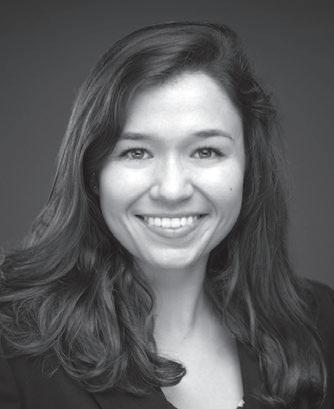
HELLO MY NAME IS
By: Bridget J. Pyman Arnett | Baker
BRENDAN WALSH

March’s Hello My Name Is column features new attorney Brendan Walsh. Brendan graduated from University of Tennessee’s College of Law in 2023 and now practices with Wimberly Lawson Wright Daves & Jones, PLLC. Brendan’s practice is comprised primarily of general civil defense work; particularly, general liability, insurance defense, employment law, and workers’ compensation.
Prior to beginning his legal career, Brendan attended State University of New York, College at Geneseo, and earned his undergraduate degree in Accounting/Finance. His legal community involvement includes participating in the Knoxville Bar Association and Tennessee Bar Association.
When he’s not immersed in legal matters, Brendan indulges in various interests, from skiing and trail-riding to honing his culinary skills. Through his responses, Brendan shares insights into his multifaceted journey, intertwining professional pursuit with a commitment to community service and personal growth.
Where are you from?
I was born in Gainesville, Florida, and then lived in Upstate New York from the time I was four to 21. After completing my undergraduate studies, I joined my recently moved parents and 11 siblings down in Tennessee and began studies at a nice little law school right on UT Campus. I am now blessed to call Knoxville home.
What are your hobbies?
When not working, I have always enjoyed skiing and trail-riding. Since Tennessee possesses a distinct lack of snow, however, most of my spare time now consists of learning to cook new meals (especially Italian ones), working out, spending time with friends and family, and exploring East Tennessee.
What was your first job, and what did you learn from it?
My first job would send me back to when I was a teenager, working with my parents at a company they were building. For many years, I helped build wire harnesses for subway trains throughout the world. I learned the value of hard work, no matter what the task is – there is always something valuable to learn and a service or product to provide to make people’s lives better.
What is your favorite travel destination?
Italy is, so far, my favorite destination. I love the history,

churches, food, wine, and scenery. I have loved being able to explore the Vatican, sip wine overlooking Tuscany, have dinner in a momand-pop restaurant, and wander the picturesque landscape of the Italian coasts that meet the Mediterranean Sea…the steady mix of busy sightseeing and therapeutic leisure. It also happens to be where I spent (or lost?) two weeks of Bar Prep over the summer.
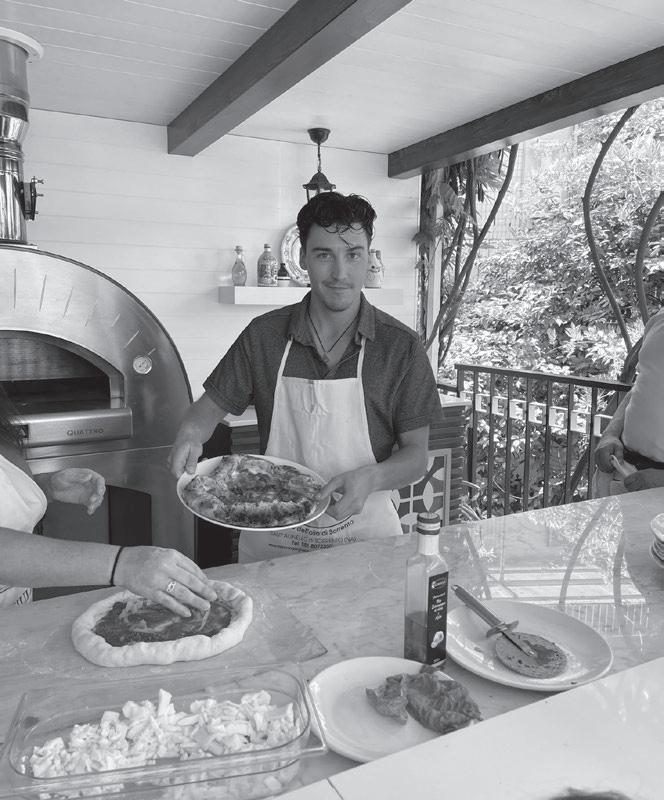
Are there any groups you belong to or lead?
I am currently the president of the Knoxville chapter of Young Catholic Professionals, which is in its very beginning stages. The goal of this organization is to help bridge the disconnect between faith and professionalism. I have personally found that while the professional demands of life can force faith to be placed on the back burner, it is the intermingling of them both that forges the greatest professional success. My desire is to find others similarly situated and create an organization that benefits the young, faith-filled professionals of Knoxville.

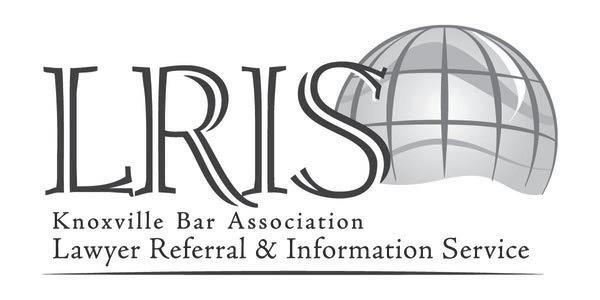

YOUR PRACTICE GROW
REBECCA REFNER Landry & Azevedo Attorneys at Law

“LRIS has really helped me kickstart my career at a small law firm by providing me with a steady stream of referrals. I have had many KBA referral clients ret rn for additional work as well!”
14 March 2024 DICTA
LRIS Panel members earned over $1.3M in LRIS-referred cases in the past 12 months. Join now for 1/2 off. Learn more at www.knoxbar.org/joinLRIS.
PRIVILEGED TO BE A LAWYER
By: John T. Winemiller Merchant & Gould
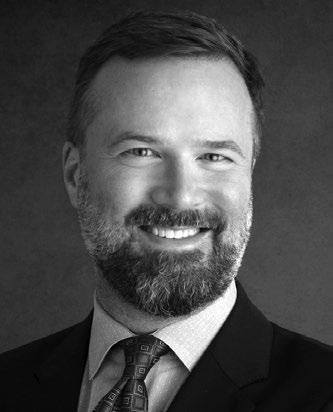
“BIG JOHN’S” EXAMPLE OF THE CITIZEN LAWYER
When I was young, I didn’t aspire to be a lawyer. I wanted to be a history teacher. I knew only three lawyers in my small hometown in Wisconsin. One of them was “Big John” Oestreicher, the father of one of my closest friends, Beth. He was a smart, kind, and generous man who used his time and talent to make the lives of his clients and fellow citizens better as a small-town lawyer, as an elected member of the Wisconsin State Assembly, and later as the first Commissioner of Wisconsin’s Hospital Rate Setting Commission. (This was back when Wisconsin was still governed by progressives in the model of Fighting Bob LaFollette.) My friend Beth and I would spend hours talking with Big John and his equally amazing wife Diane about politics and current events. Those conversations energized me, and John and Diane’s model showed me the importance of civic engagement.
As a college student, I pursued my interest in history, eventually focusing my attention on cultural history with an emphasis on the role of music in culture. In graduate school, I studied early notions of creative work as intellectual property in eighteenth-century England, earning a Ph.D. in music history. I was privileged to land a spot teaching at one of the best music history graduate programs in the country. I had great, talented students, and I was duly treading the academic path. But I wasn’t happy, and I couldn’t see myself spending a lifetime writing interesting but admittedly esoteric articles that only a small number of my fellow music historians would ever read. At the same time, I was becoming increasingly interested in copyright law and cultural attitudes about the ownership of creative work. I knew I was young enough to switch my trajectory to intellectual property law, so, I did.
Three decades later, I am happy to say that I haven’t regretted my switch once, even if I sometimes long for the more leisurely, less stressful life I left behind. The law’s mix of the intellectual and the practical appeals to all corners of my academic brain. My focus on IP law has been everything I hoped for, even though I work much more often on trademark, patent, and trade secret matters than the copyright issues that led me to law school. But the thing that brings me the greatest joy and makes me most proud to be a lawyer is what I do outside the office.
Like many of you, I have spent countless hours since graduating from law school using my legal training without compensation – through pro bono work, through service on boards, and through other forms of civic engagement. On the pro bono front, I have focused my efforts on two very different causes. I’ve worked with Lambda Legal on several cases that have resulted in better, more equitable treatment of the LGBTQ+ members of our community. In one case involving the public humiliation of men caught up in a sex-sting operation, leading to one death by suicide, our team negotiated a settlement agreement under which a local police department instituted training that has demonstrably reduced bias and callousness and increased cooperation and trust between
a marginalized community and law enforcement. I’ve also handled many cases as part of the Hague Convention Attorney Network, which helps non-custodial parents locked in disputes with custodial parents in other countries. These cases seldom have “winners,” but I find meaning in being able to offer some help in the face of despair and distance that perhaps makes the process somewhat less horrible.
On the community front, I have had the privilege of serving on and leading several boards of local organizations. Board work is often fun and satisfying, as when the organization is a well-oiled machine contemplating what’s next. One of my points of pride is serving on the committee of the Knoxville Symphony Orchestra board that selected Aram Demirjian as music director. The process was fun, but the reward has been enjoying a rising star practice his craft in our community.
On the civic front, I’m nearing the end of my second five-year term as a member of the Board of Commissioners of Knoxville’s Community Development Corporation. I am immensely proud of KCDC, which is recognized across the country and by the U.S. Department of Housing and Urban Development as a model of public housing authorities. Over the last ten years, KCDC has taken on massive redevelopment projects like First Creek and Western Heights that provide high-quality affordable housing for hundreds and hundreds of Knoxville families, and it has revamped its funding model to leverage public-private partnerships to upgrade aging housing stock in an era of scarce federal funding.
All this brings me back to Big John Oestreicher and the model he provided me 40 years ago. While my path is different than his, my life is richer because I have taken to heart his example of a lawyer’s civic engagement. I understand the opportunities described above came to me largely because I’m a lawyer. And I recognize that is a singular privilege.

DICTA March 2024 15
MOORE V. UNITED STATES: NAVIGATING CONGRESS’S POWER TO TAX
The Supreme Court heard oral arguments in an appeal from the Ninth Circuit Court of Appeals regarding whether a one-time mandatory repatriation tax on income from foreign sources falls within Congress’s power to levy and collect taxes on incomes under the Sixteenth Amendment.1 In the realm of tax law, Moore v. United States is a pivotal moment in understanding Congress’s authority to levy taxes, the concept of realization, and the implications of the mandatory repatriation tax. The heart of this case is the extent of Congress’s power to tax unrealized gains under the Sixteenth Amendment.
Development of Congress’s Power to Tax
Throughout U.S. history, Congress’s taxing power has had very few limitations. Article I, Section 9, Clause 4, known as the Apportionment Clause, of the early Constitution limited Congress’s power to tax. The Apportionment Clause stated “[n]o Capitation, or other direct, Tax shall be laid, unless in Proportion to the Census or Enumeration herein before directed to be taken.”2 This language from the early constitution delineated between direct taxes and indirect taxes. Case law interpreting the Apportionment Clause defined indirect taxes as the taxation on the consumption of goods and services.3 Direct taxes included capitation taxes, taxes on real estate, and taxes on income from real estate and personal property.4 This delineation between direct taxes and indirect taxes was quite controversial, leading to the ratification of the Sixteenth Amendment.
The Sixteenth Amendment was ratified in 1913. It provides that “Congress shall have the power to lay and collect taxes on incomes, from whatever source derived, without apportionment among the several states, and without regard to any census or enumeration.” The ratification of the Sixteenth Amendment eliminated the historical taxation principle of direct and indirect taxes. Additionally, the ratification of the Sixteenth Amendment removed the apportionment requirement on direct taxes.
Traditionally, the U.S. tax system is based on the principle of realization, where income is taxed upon the sale or disposition of an asset. As an example, appreciation in the value of real estate is not income until the real estate is sold. When real estate is sold, the appreciation is then taxed as a gain. This was the holding in Eisner v. Macomber 5 In this landmark case, the Court held that “enrichment through increase in value of capital investment is not income in any proper meaning of the term.”6 The Court has never overruled the holding in Macomber that income requires realization.
Despite this, in 1962, Congress removed the realization principle as it applied to the taxation of foreign corporations. In 1962, Congress enacted Subpart F of the Internal Revenue Code, which directed the taxation of foreign corporations. Subpart F requires U.S. shareholders of certain foreign corporations to pay taxes on shareholder’s shares of a corporation’s foreign income, regardless of whether income is distributed to shareholders or not.7 Before Subpart F, U.S. shareholders were only
taxed on the earnings of corporations when earnings were distributed to U.S. shareholders, holding with the principal of realization. Under Subpart F, U.S. shareholders faced a 35 percent corporate tax on profits from foreign sources. This system had many downsides, including encouraging U.S. shareholders to keep earnings offshore, which led to $2 trillion in deferred foreign earnings. Additionally, the U.S. corporate tax rate was uncompetitive and led many entities to move their legal residence overseas. These problems were addressed by reforms in 2017.
In 2017, Congress passed, and President Trump signed, the 2017 Tax Cuts and Job Act (“TCJA”).8 The TCJA imposed a one-time mandatory repatriation tax9 (“MRT”) on U.S. taxpayer controlled foreign corporations (“CFC”). This tax was designed to offset other tax benefits granted to U.S. Corporations. The MRT includes “accumulated post1986 deferred foreign income as part of the CFC’s taxable income in 2017.”10 The MRT essentially imposed a one-time inclusion of foreign earnings for the past 30 years as taxable income. The MRT represents a departure from traditional principles of realization, as it imposes a tax on previously untaxed foreign earnings without requiring an actual repatriation or realization event.
Factual Background
In 2005, Charles and Kathleen Moore invested $40,000 in a friend’s startup company, KisanKraft,11 in exchange for 13% of KisanKraft’s common shares.12 The Moores reinvested all their pro rata accumulated earnings from 2006 to 2017 in KisanKraft.13 As a result, the Moores did not receive any income distributions from KisanKraft during this time. In 2018, the Moores discovered they were liable for taxes attributable to MRT of the 2017 TCJA, which subjected the Moores to approximately $15,000 in taxes.14 The Moores’ tax liability under the MRT is calculated based on the Moores’ pro rata share of KisanKraft’s retained earnings. Although the amount in dispute is relatively small, the outcome of this case could have significant implications.
The TCJA introduced significant reforms to the U.S. tax system, including a one-time tax on previously untaxed foreign earnings of certain specified foreign corporations, known as the MRT. The Moores argue that the MRT violates the Sixteenth Amendment because it taxes unrealized income that was never distributed to them.15 The U.S. Government contends that the MRT is in fact an income tax and that the Sixteenth Amendment does not require income to be realized before it can be taxed.16
Potential Implications
The outcome of this case could have a significant impact on the U.S. tax system. According to attorneys for the Moores, a broad ruling in favor of the government could “open the door to expansion of the deferral taxing power beyond the limits placed by the Constitution.”17 Other proponents for the Moores argue this could open the door for Congress
16 March 2024 DICTA

to tax unrealized gains on real estate or its rental value.18 Additionally, proponents for the Moores argue this could open the door to a wealth tax on unrealized gains on securities. Valuing unrealized gains and losses on securities would wreak havoc on the U.S. tax system. More specifically, valuing unrealized gains and losses would be costly and profoundly unworkable, especially for non-publicly traded securities.19
On the other hand, those on the side of the United States equally argue that a broad ruling for the Moores would also wreak havoc on our tax system.20 The United States argued in its response brief that simply invalidating the MRT could cost the government $340 billion over the next decade.21 Additionally, the United States argues invalidating the MRT would “call into question longstanding regimes like Subpart F, partnership, and S-corporation taxes.”22 Overturning Subpart F alone could “cost several trillions of dollars in lost tax revenue.”23 Lastly, invalidating the MRT would require the government to issue a multitude of MRT refund claims, which would be administratively burdensome.24
Prediction
Luckily for both sides neither of these far-reaching outcomes appear to be likely after oral arguments. During oral arguments, the Court appeared to be prepared to offer a narrower ruling.25 Justice Brett Kavanaugh for example seemed open to upholding the tax with a narrow ruling using an attribution justification.26 He opined, “there was realized income here to the entity, and then it’s attributed to the shareholders in a manner consistent with how Congress has done that and this Court has allowed.”27 Justice Amy Coney Barrett also seemed likely to forego the Sixteenth Amendment realization issue and rule the income was in fact realized albeit to the corporation.28 She questioned whether or not this is more of a due process issue of fairness of when the realized
COVER STORY
By: Neva M. Foust and John R. Foust Foust & Foust, PLLC

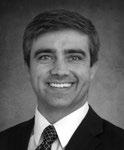
income was attributable to the Moores, rather than an interpretation of the Sixteenth Amendment.29 Justice Sonia Sotomayor seemed little swayed by the Moores’ argument. She began her line of questioning to the Moores’ attorney by attempting to draw a distinction between how a partnership is an entity, yet its partners themselves are taxed.30 She continued her line of questioning regarding S-corporation passthrough taxation and how the constitutionality of that could be justified if realization to the shareholders themselves was required under the Sixteenth Amendment.31 Justice Elana Kagan also seemed sympathetic to the Government’s position.32 And although Justice Clarence Thomas and Justice Neil Gorsuch asked probing questions regarding the consequences of the government’s position, only Justice Samuel Alito appeared most interested in siding with the Moores’.33
That said, the Court is often difficult to predict. However, based on oral arguments, it seems as though the Supreme Court is poised to issue a narrow ruling. This narrow ruling would likely hold the MRT to be constitutional through existing precedent without specifically addressing the Sixteenth Amendment realization issues.
1 See Moore v. United States, U.S. Sup. Ct. No. 22-800.
2 U.S. Const., Art. I, § 9, Cl. 4.
3 See Springer v. United States, 102 U.S. 586, 602 (1880) and Polluck v. Farmers’ Loan & Trust Co., 158 U.S. 601 (1895).
4 Id.
5 Eisner v. Macomber, 252 U.S. 189 (1920).
6 Id. at 214-15.
7 Revenue Act of 1962, Pub. L. No. 87-834, § 12, 76 Stat. 1006-1031.
8 Pub. L. No. 115-97, 131 Stat. 2504.
9 Repatriation refers to tax imposed on a taxpayer or taxpaying entity on the money earned overseas.
10 26 U.S.C. 965(a) and (b).
11 KisanKraft is a manufacturer and supplier of farm equipment and tools to underserved farmers in India, according to its website, www.kisankraft.com.
12 Brief of Petitioners at 11, Moore v. United States of America, No. 22-800 (U.S. Aug. 2023).
13 Id. at 12.
14 Id.
15 When the Moores appealed to the Supreme Court, the Moores did not appeal based on due process as they did in the lower courts.
16 Respondent’s Brief, at 11, Moore v. United States of America, No. 22-800 (U.S).
17 Brief of Petitioners for Writ of Certiorari at 39, Moore v. United States of America, No. 22-800 (U.S. Feb. 2023)
18 Brief of Amicus Curiae of The Chamber of Commerce of the United States of America in Support of Petitioners at 13, Moore v. United States of America, No. 22800 (U.S. Sept. 2023).
19 Id. at 14.
20 Brief of Respondents at 49, Moore v. United States of America, No. 22-800 (U.S. Oct. 2023).
21 Id.
22 Id.
23 Transcript of Oral Argument, Moore.v. United States, U.S. Sup. Ct. No. 22-800 (2023), available at http://www.supremecourt.gov/oral_arguments/argument_ transcripts/2023/22-800_097c.pdf.
24 Id.
25 Amy Howe, Oral argument suggests narrow ruling to uphold disputed tax, SCOTUSblog (Dec. 5, 2023, 4:05 PM), https://www.scotusblog.com/2023/12/oralargument-suggests-narrow-ruling-to-uphold-disputed-tax/.
26 Transcript of Oral Argument, Moore.v. United States, U.S. Sup. Ct. No. 22-800 (2023), available at http://www.supremecourt.gov/oral_arguments/argument_ transcripts/2023/22-800_097c.pdf.
27 Id.
28 Id.
29 Id.
30 Id.
31 Id.
32 Id.
33 Id.
DICTA March 2024 17
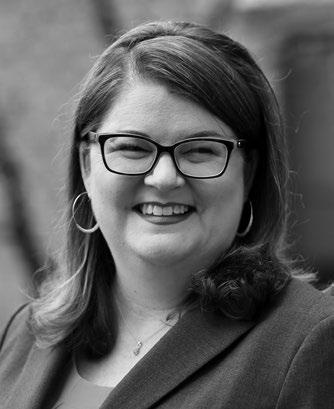
IN LIMINE: PROFILING FUTURE JDS
By: Carol Anne Long UT Law Director of the Career Center
COREY LEE
UNIVERSITY OF TENNESSEE
COLLEGE OF LAW, CLASS OF 2025
Please tell me about yourself!
I am from the great city of Memphis, Tennessee. I attended California Lutheran University in Thousand Oaks, California, where I received a Bachelor’s Degree in Business Administration with an Emphasis in Finance.
So how did you make the decision to go to law school, and why did you pick UT Law?
My decision to attend law school stemmed from my desire to be more purposeful with my life. I spent four years working in corporate finance before coming to law school. During that time period, I felt the desire to chart a new path that would fully maximize my talents. After months of deliberation, law school prominently stuck out as the best choice. The legal field is essentially a service industry, and I love interacting with and helping people when problems arise. I chose UT Law for the culture of the school. On my student visit, everyone was so hospitable. The environment struck me as one of collaboration and unity rather than just a purely competitive space. After one year at UT Law, my first impression observations remain true.
Tell me about your law school experience so far: what activities and classes have you participated in and enjoyed?
Law school has given me the great opportunity to pursue different areas of interest to me. In my 1L year, I joined UT Law’s Black Law Student Association (BLSA), where other African-American law students in the school congregate to support and celebrate each other. UT has also offered me the chance to serve the Knoxville community, whether it be through pro bono programs such as the Black Small Business Legal Clinic or the Bankruptcy Court Clinic. Not only have I served the Knoxville community, but I also have the distinct pleasure to serve the law school community as the Student Bar Association Vice President. UT Law has done a fantastic job of providing opportunities with the school and the community, and I have enthusiastically taken advantage of both.
What work experiences have you had so far, and what will you be doing this summer?
Last summer, I worked at the Giffords Law Center, which is a Gun Safety Advocacy organization, and I worked with their federal policy group. I thoroughly enjoyed my time with Giffords. I was a contributor from day one, and I felt that my work made a real impact in the push for gun reform in our country. I have nothing but high praise for my former colleagues at Giffords! This summer, I am looking forward to working at Milberg, Coleman, Bryson, Phillips & Grossman with their Class Action group in the Knoxville office. I am excited for this upcoming experience in litigation work, which is my area of focus now.
What type of law do you want to practice and where would you like to end up?
With my background in finance and passion for advocating, I would
enjoy the opportunity to practice commercial litigation.
You recently represented UT Law at the American Bar Association’s Judicial Clerkship Program, as part of the ABA’s midyear meeting in Louisville. What was your experience like?
My experience at the ABA’s Judicial Clerkship Program was phenomenal. It was a great opportunity to gain exposure to what judicial law clerks do and the important skill sets needed to be a great law clerk. Legal research and writing were at the top of the list, but even more important was the clerk’s ability to foster a great working relationship with the judge. A positive working relationship is critical to the success of the clerk and the judge because clerks reflect the judge’s voice. My favorite part of the experience was having the change to meet and connect with judges, attorneys, and other law students from around the world. I grew both intellectually and personally from this experience.
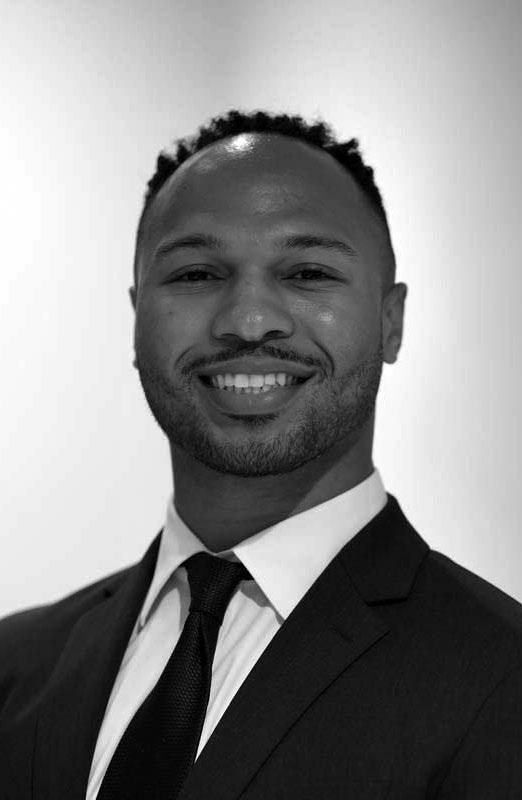
So outside of law school, what do you enjoy doing?
In what little free time I have, I enjoy working out and watching my favorite sports teams. I am a die-hard Memphis Grizzlies fan!
Finally, what is your ultimate “why” with respect to being an attorney?
My “why” for being an attorney is that I love serving people. My family taught me that people are given talents for the purpose of sharing and helping others with them. As an attorney, it is a duty to serve others with the skills you obtain. The duty aligns with my ethos to serve others.
*Hiring Footnote
Once upon a time, the phrase “business attire” did not need any further explanation or clarification. But these days, business attire means different things to different employers. When hiring law students for summer positions, let them know what the attire expectations are for your office, and you might need to provide more information that just letting them know that “business casual” is acceptable. Define what that phrase means for your office, and if possible, give them enough notice before the start of their job that they have time to purchase what is needed. And along those lines, please be aware that with student loans and limited budgets, law students may not have the resources to get a lot of professional attire, so be as understanding and lenient as possible.
18 March 2024 DICTA
SCHOOLED IN ETHICS
By: Alex B. Long
Williford Gragg Distinguished Professor of Law University of Tennessee College of Law
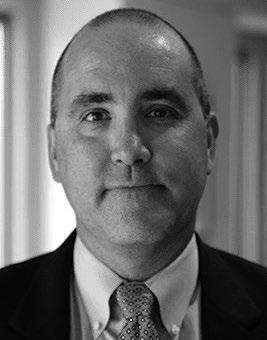
LEGAL ETHICS ISSUES INVOLVING ARTIFICIAL INTELLIGENCE CONTINUE TO EMERGE
Back in June 2023, lawyers from the firm of Levidow, Levidow & Oberman P.C. made news when they relied on artificial intelligence tool ChatGPT to research a brief they were filing with a court. The problem? ChatGPT “hallucinated.” Stated differently, ChatGPT made up a couple of non-existent decisions, which the lawyers didn’t bother to check before submitting their brief to the court. (For more information on this case, see the August 2023 issue of DICTA.). One would have thought the widespread publicity resulting from the case would have served as a lesson for future lawyers who were thinking about relying upon ChatGPT or other generative AI to conduct legal research.
But apparently not. In December 2023, lawyer and former Donald Trump fixer Michael Cohen used the generative AI tool Google Bard to help research a motion his lawyer was going to file on his behalf in order to seek an early end to his court-ordered supervision. Google Bard hallucinated three fictional case citations. Cohen, who admitted to not having kept up with legal technology trends, gave the research to his attorney, who apparently failed to check the fictional cites before submitting a brief to the court.
As lawyers increasingly incorporate artificial intelligence into their practices, legal ethics issues take on greater importance. In January, the Florida Bar issued what is perhaps the first formal ethics opinion on the use of AI in practice.1 The opinion identifies several ethics issues related to the use of AI, including confidentiality, oversight and supervision, billing, and advertising. Below are a few of the highlights of the opinion:
Confidentiality: Lawyers need to understand that “generative” AI is self-learning, in the sense that “it continues to develop its responses as it receives additional inputs and adds those inputs to its existing parameters.” Therefore, it is possible that client information that is entered into a program will be stored and potentially revealed to future users in violation of a lawyer’s duty to exercise reasonable care in keeping client information confidential.
Oversight and supervision: Tennessee RPC 5.3 imposes a duty of supervision over non-lawyer assistants. Putting aside the question of whether generative AI qualifies as an “assistant” under this rule, the Florida opinion analogizes AI to other human assistants lawyers have traditionally relied upon in their practices: “Lawyers who rely on generative AI for research, drafting, communication, and client intake risk many of the same perils as those who have relied on inexperienced or overconfident nonlawyer assistants.” Lawyers must understand the risks of relying upon AI (such as the potential for hallucinations) and review the work product and verify its accuracy as a lawyer would with a paralegal or other non-lawyer assistant.
Billing: Generative AI programs may result in greater efficiency for lawyers. But the opinion warns lawyers against over- or double-billing for research or other tasks performed by AI. The opinion also advises that the rules regarding billing and communication of costs that are to be billed to the client “require a lawyer to inform a client, preferably in writing, of the lawyer’s intent to charge a client the actual cost of using generative AI.”
Advertising: Florida’s rules regarding lawyer advertising differ substantially from Tennessee’s. But the gist of both is that an advertisement may not contain false or misleading information. Law firm websites increasingly used AI chatbots that mimic the appearance of human beings and engage in online conversations with potential clients. The opinion concludes that “[t]o avoid confusion or deception, a lawyer must inform prospective clients that they are communicating with an AI program and not with a lawyer or law firm employee.”
The opinion goes into greater depth on each of these topics. In the absence of guidance from the Tennessee Board of Professional Responsibility on the subject, the opinion should be required reading for Tennessee lawyers seeking to gain a basic understanding of these ethical issues. More ethics opinions from other jurisdictions will almost certainly be forthcoming in the near future.
1 Florida Bar Ethics Opinion 24-1 (Jan. 19, 2023), https://www.floridabar.org/ etopinions/opinion-24-1/. The California Bar issued Practical Guidance for the use of Generative Artificial Intelligence in the Practice of Law in November 2023, https://www.calbar.ca.gov/Portals/0/documents/ethics/Generative-AI-PracticalGuidance.pdf
The Law Offices of
Office Space Available-
We have a 15' x 12.5' office space available for sublease at our office location at 1356 Papermill Pointe Way, Knoxville, TN 37909 (Class A) Free and convenient parking available for clientele. Access to phone system. If you are an attorney, we are close to Juvenile Court, as well as a possibility for referrals as we routinely get calls for areas in which we do not practice. Access to two conference rooms. Open to other professionals as well. If interested, contact John Dreiser at (865) 584-1211
DICTA March 2024 19
If you have an idea for Schooled in Ethics column, please contact Cathy Shuck at 541-8835.
Tony
Farmer & John Dreiser
MONTHLY MEETING
Plan now to attend the Barristers monthly meeting on Wednesday, March 13, starting at 5:15 pm at The Firefly, the outdoor patio at the Hilton, located at 501 W. Church Avenue, Knoxville. Social time starts at 5:00 pm. All Barristers members are invited to attend, meet fellow attorneys, and learn about upcoming Barristers events.
VOLUNTEER BREAKFAST COMMITTEE CONTINUES OPERATIONS
The Volunteer Breakfast is a recurring event on the 4th Thursday of each month at 6:15 a.m. at the Volunteer Ministry Center, located at 511 N. Broadway, Knoxville, Tennessee. The Barristers Volunteer Breakfast Committee always needs volunteers to serve food or sponsor. The cost is $150 for sponsoring, and we need 4-5 volunteers. If you are unable to fund the breakfast, the Barristers will subsidize the cost of the breakfast. We meet at 6:15 a.m. and serve breakfast to approximately 30-40 individuals, generally leaving the site around 7:30 a.m. It’s a great way to serve the community! Please contact either Matt Knable at mknable@ wkfirm.com or Miranda Goodwin at mirandaegoodwin@gmail.com with any questions and/or about volunteering.
DIVERSITY COMMITTEE COLLECTS DONATIONS FOR SCHOLARSHIP FUND
The Barristers Diversity Committee has created a scholarship fund to help with travel and lodging costs for diverse students who are invited to attend preview days hosted by the local law schools. Members are asked to make a donation to help ensure that one student, who may not otherwise be able to afford to visit a law school in Knoxville prior to their enrollment, is able to attend a preview day. If you have questions, please reach out to Mariel Bough (mariel.bough@verasafe.com) or Grant Williamson (gwilliamson@bradley.com) for more information on how your donation will be used, or for more ways to get involved with the Barristers Diversity Committee’s efforts to make the Knoxville Bar Association a more inclusive and diverse organization. Information on how to donate online can be found on the KBA website on the Barristers Diversity Committee page.
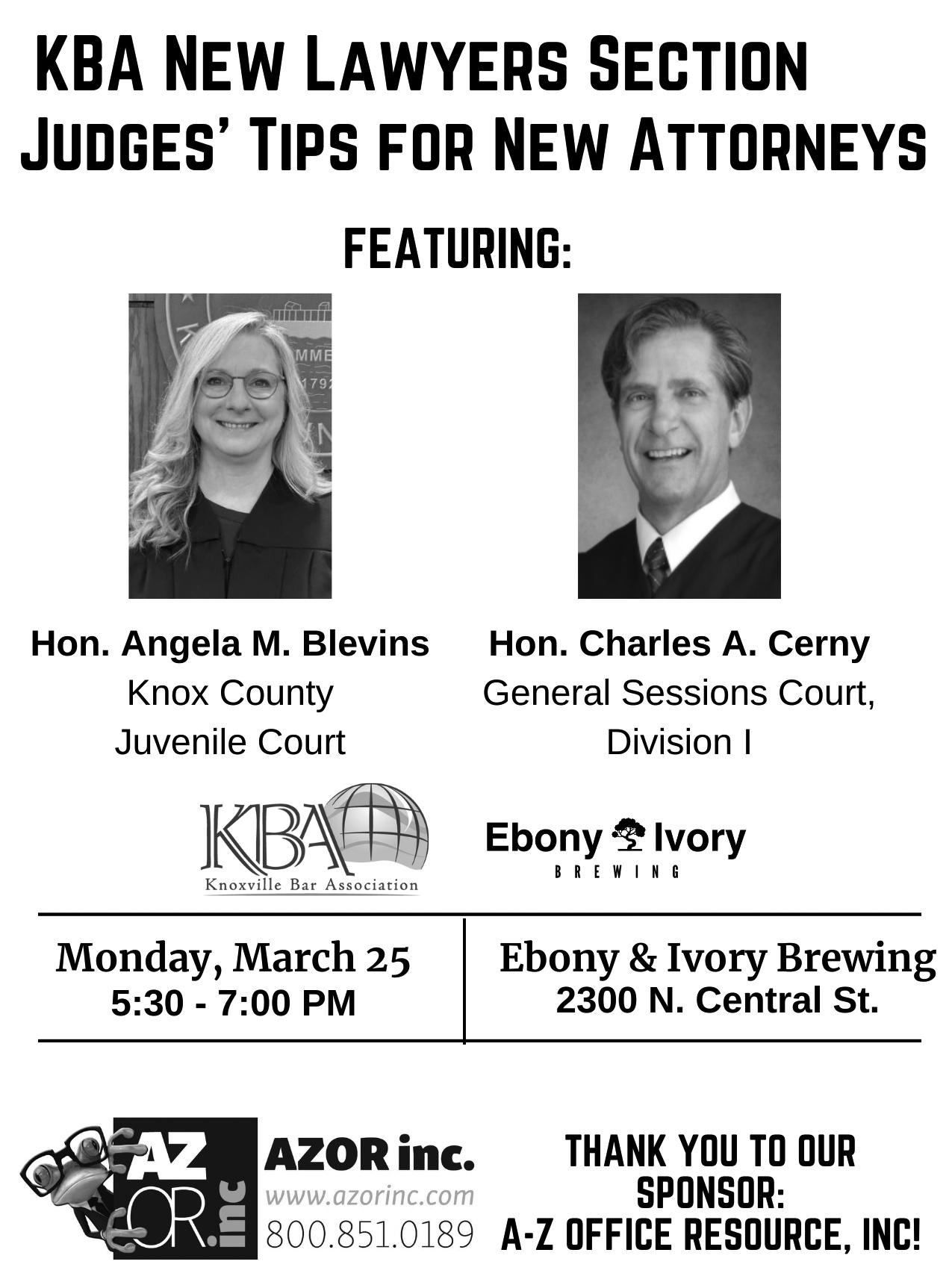
WELCOME NEW MEMBERS
THE KNOXVILLE BAR ASSOCIATION IS PLEASED TO WELCOME THE FOLLOWING NEW MEMBERS:
NEW ATTORNEYS
Casey T. Arrowood
U.S. Attorney’s Office
Kyle S. Ayers
Trammell, Adkins & Ward, P.C.
Wendy A. Bach
U.T. College of Law
Jin Choi Davis Wright Tremaine LLP
Derrick M. Davis
LegalForce RAPC Worldwide
Stanley Graham Holland & Knight, LLP
Shelby Burchell Greenamyer
Relyant Global, LLC
Jeannine Guzolek
Office of the District Attorney General, 6th Judicial District
Elizabeth L. Marsh
Meares and Dillard
Thomas G. Martin
Young, Williams & Theiss, P.C.
Nathan Morgan
DeRoyal Industries, Inc.
Jennifer Watson Newton
U.S. District Court
Christopher A. Parker
Mital D. Patel
TriAmicus Law, PLLC
Lyndsey M. Phillips
Biloski & Miller
Marissa L. Price
District Attorney General, 6th Judicial District
Lydia Schlitt
Knox County Public Defender’s Community Law Office
Alexandria F. Smith
Baker, Foster, Potter, P.C.
Brendan M. Walsh
Wimberly Lawson Wright Daves & Jones, PLLC
C. Justin Whitaker
NEW LAW STUDENT MEMBERS
Elizabeth Bates
John Coffey
Layton Coker
Martin P. Ginski
Nathan A. Holliman
Christian T. Layne
Collin Riggs
Brett T. Strother
Robert C. Terrell
20 March 2024 DICTA
OF LOCAL LORE & LAWYERS
By: Joe Jarret, J.D. Ph.D. Attorney, University of Tennessee
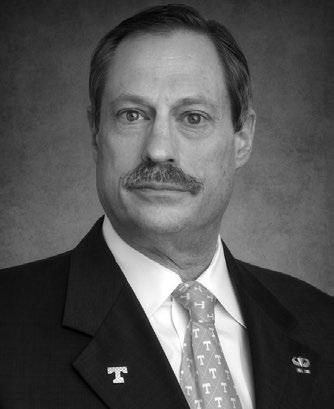
A CAPITAL BREAKFAST
Immediately prior to relocating to Knox County, I served Polk County, Florida, as its law director. Besides the duties and responsibilities you’d presume came with such a position (litigation, representing the county commission and other constitutional offices, managing the office, etc.), I was required to accompany my commissioners on their yearly trek to Washington, D.C. The purpose of these annual junkets was to meet with members of Congress with the hope of leaving with either a commitment to assist us with infrastructure improvements or, better still, a check for the same. During one such visit, we arrived on a cold, blustery January evening, so my clients and I agreed to meet in the hotel restaurant at 8:00 the next morning for breakfast and a strategy session. It was my usual custom when in D.C. to rise early and jog around the city, and this day was no exception.
I arose at 6:00 am, postponed a shave and a shower, donned my battered but true “Proud to be an Army Veteran” cap and equally worn U.S. Army sweatshirt, and took off for a leisurely jog down Pennsylvania Avenue. I passed the White House, and trotted down to the National Mall and by several beloved monuments. I then decided I could use a cup of coffee. I ended up at a bustling café on I Street, and, while waiting in line for a table, reached down into my sweatpants for the four single dollar bills I had there. As I began to smooth out the crumpled bills, I felt a tap on my shoulder. Turning around I came face to face with an elegantly dressed gentleman, sporting a suit and matching overcoat that were clearly not bought off the rack at some discount clothing store. Beaming, he asked in a low voice, “Are you a Veteran, son?” Initially startled by the question, it then occurred to me that he noticed my cap. “Yes sir,” I responded. He continued, “Can I ask how long and where you served?” I told him and, in response, he grasped my right hand and placed a $20 bill in it, saying, “Get yourself a hot breakfast, soldier.”
LEGAL UPDATE, continued from page 11
and equal enjoyment of the goods, services, facilities, privileges, advantages, or accommodations of any place of public accommodation.” 42 U.S.C. §§ 12182(a), 12181(7)(A). Title III further creates a private right of action permitting “any person who is being subjected to discrimination on the basis of disability” to sue for violations. 42 U.S.C. § 12188(a)(1).
3 28 C.F.R. § 36.302(e)(1)(ii) (2022); see also Madiba K. Dennie, Rights Without Remedies Might As Well Not Exist, BallS and StrikeS (Sept. 27, 2023), https:// ballsandstrikes.org/scotus/acheson-hotels-v-laufer-supreme-court-preview/
4 455 U.S. 363, 373–74 (1982) (“A tester who has been the object of a misrepresentation made unlawful under § 804(d) has suffered injury in precisely the form the statute was intend to guard against, and therefore has standing to maintain a claim for damages under the [Fair Housing Act’s] provisions.”).
5 See Dennie, supra note 3.
6 Minh N. Vu, et al., SCOTUS Punts on Whether ADA ‘Testers’ Have Standing in Acheson v. Laufer, Seyfarth Shaw llP: ada title iii (Dec. 6, 2023), https://www. adatitleiii.com/2023/12/scotus-punts-on-whether-ada-testers-have-standing-inacheson-v-laufer/.
7 Id.
8 See Dennie, supra note 3.
9 Acheson Hotels, LLC v. Laufer, 601 U.S. 1 (2023).
10 Id. at 1.
11 Id. at 3 (emphasis added).
12 Id. at 3–4 (discussing the suspension of Laufer’s counsel) (citations omitted).
13 Id. (citations omitted).
14 Id. at 4.
15 Id. (“Laufer does not argue that we must dismiss her suit for mootness. She acknowledges that we can address jurisdictional issues in any order we choose . . . and so have authority to resolve the standing issue.”).
16 Laufer v. Acheson Hotels, LLC, No. 2:20-cv-00344-GZS, 2021 WL 1993555, at *2–3
When I recovered from this kind gesture, I said “No, thank you so much, but I’m fine. I do appreciate the gesture, however.” Again lowering his voice, he said, “There’s no shame in being hungry or homeless. Please, it would be our pleasure.” He then pointed across the restaurant to an equally, elegantly dressed woman I presumed to be his spouse who gave me a wave. “Please,” I stammered, “you don’t understand. I’m not hungry or homeless. In fact, I’m a Florida attorney here with my clients to meet with our members of Congress.” Still smiling, he gently said, “Of course you are my boy, of course you are. You meet with those nice members of Congress, but in the meantime, let us treat you to a hot meal. It’s the least we can do.” Before I could object further, he was gone. And so, I was finally led to a table where I ordered a cup of coffee and a bagel. When the bill came, I handed the server the twenty and told her to keep the change. Eyeing me suspiciously she said, “Are you sure?” “I’m sure,” I said. As I was leaving, I bent down to tie my shoe and heard the server exclaim to a coworker, “That homeless guy that was just sitting here gave me a $13.00 tip!” “Go figure!” her colleague responded, shaking her head.“You gotta love D.C.!”
I jogged back to the hotel without incident, marveling at the generosity of strangers in a city that boasts a reputation for ruthless, cutthroat politics. I was able to get through the lobby and to my room without raising suspicions or being accused of vagrancy. After a hot shower and shave, I donned a business suit and joined my clients in the restaurant. Over my second cup of coffee of the morning, I related my encounter with the magnanimous couple. My confession evoked a round of mild ribbing and suggestions as to how I could capitalize on the experience. The way I saw it though, you’re only entitled to one capital breakfast in your life.
(D. Maine May 18, 2021) (discussing the facts underlying Laufer’s claim).
17 Acheson, 601 U.S. at 3.
18 Id.
19 See id. at 5 (“Acheson warns that if we dismiss this case for mootness, the standing issue might not come back anytime soon. While Laufer has disavowed the intention to file any more ADA tester suits . . . others will file in the circuits that sided with her, and hotels will settle, regarding it as pointless to challenge circuit precedent in this Court.”).
20 Id.
21 See id. at 3.
22 Id.
23 See Vu et al., supra note 6.
24 See Acheson, 601 U.S. at 6–14 (Thomas, J., concurring) (agreeing with the mootness of Laufer’s claim but arguing that she also lacked standing to sue); Acheson, 601 U.S. at 14–22 (Jackson, J., concurring) (disagreeing with the Court’s decision to vacate and remand the First Circuit’s ruling in favor of Laufer’s standing to sue under the Reservation Rule).
25 Acheson, 601 U.S. at 12 (Thomas, J., concurring).
26 Id. Thomas further argued that Laufer’s position as a tester essentially usurped the role of Government agents to enforce the provisions of the ADA. See id. at 14 (“Ensuring and monitoring compliance with the law is a function of a Government official, not a private person who does not assert a violation of her own rights.”).
27 See Acheson, 601 U.S. at 22 (Jackson, J., concurring) (“The parties in this case have not provided any equitable basis for vacatur of the Court of Appeals’ judgment, nor has the majority described any, beyond its reference to the Court’s past practices. . . .”).
28 Acheson, 601 U.S. at 5.
DICTA March 2024 21

TOP TEN
By: Sarah M. Booher Tennessee Department of Human Services
SONGS FOR EMBARRASSING YOUR KIDS IN THE CAR
If we’re to take the word of a groundhog in Pennsylvania over our ever-so-slightly more reliable meteorological sisters and brothers, Spring is just around the corner. This is incredible news. For me, it means I can finally roll down the windows, open my sunroof, and drive around on beautiful, sunny days playing the most unexpected tunes to ever be blasted from a car. It’s also a chance to fleetingly regret my decision to not have children – I’d be so great at embarrassing them! So, for those of you who live to embarrass your children in the school pickup line, are ready to bulk up your playlist, or need inspiration to survive West Knoxville traffic, I give you these ten musical gems.1
10. Sk8er Boi; Avril Lavigne: If you want your children to have a more international appreciation for music, Avril is your girl for the job.2 This 3:23 minute tune is a reminder to give everyone a chance. It’s also a time capsule of an era before skinny jeans extinguished the wide leg jeans that roamed the Earth. Even better if you can still listen to it in any hatchback car with an aftermarket squirrel-fart muffler.
9. Send Me on My Way; Rusted Root: If we were wanting to glean any sort of a narrative from this 1992 hit, it seems the lead singer “would like to reach out my hand.” Why he’s reaching out his hand or what’s going to happen after is beyond anyone’s knowledge because the remaining lyrics are almost entirely unintelligible. What we can discern with some confidence is that he suffers from random and unexplained shivers, because a rabbit is running over his grave for the entire song.
8. What’s My Age Again; Blink-182: I was torn between this song and House of Pain’s Jump Around. The former is a boppy reminder that we can’t remain annoying little punks forever. The latter is a lyrically-succinct appreciation of getting up off that seat and engaging in physical activity. I’ll let you be the judge here.
7. I Wanna Dance With Somebody; Whitney Houston: While there were many terminally cool songs and artists I wanted to include on this list, we must walk a fine line if we’re trying to keep the kids in check and regularly paying their humility tax. However, Whitney Houston was and is the Ferris Bueller of 80s pop music; she’s comfortable on any playlist. This song will always be one of the greatest of all time, it has those nice high notes the whole family can struggle to hit together, and those minors are going to loathe the thought of their adults dancing. Ugh!
6. Chasin’ That Neon Rainbow; Alan Jackson: For all of us who love a blond man with long legs in a fine pair of jeans, this song lends itself to your best and thickest Southern accent (for me that requires absolutely zero effort), and the sheer number of times he says “honky-tonk” will surely mortify your more cosmopolitan-leaning children. Plus, it spares you the blush that comes with explaining what the true meaning of Chattahoochee
5. Straight Up; Paula Abdul: I grew up knowing her as a Top 40 artist who was once a Lakers cheerleader and married Emilio Estevez. Your kids know her as an American Idol judge who claps like a seal and makes cringe TikTok dance videos.3 No effort is required here – your kids will be mortified simply by how ancient you are.
4. Kryptonite; 3 Doors Down: Are you sure your kids know what
kryptonite is? And are they even calling you Superman? If you go crazy, will they still call you Superman? These are important questions that require answers that can only be given by blasting the song really loud for all the world to hear.
3. No Sleep till Brooklyn; Beastie Boys: Have you ever sat your children down and tried to explain the cultural relevance of the Beastie Boys to them? If so, were you successful??? Nothing made me need AARP, a good skin cream, and a stiff drink more than attempting that conversation once with my renters. White, Jewish rappers from NYC! Wild and revolutionary! They just stared and slowly blinked a few times before shutting the door.

2. The entire George Michael discography: I discovered during Covid that George Michael is the ideal complement to any perfect spring day. Seriously. Careless Whisper, Father Figure, Everything She Wants, Freedom, whatever. You cannot. go. wrong. I don’t even care if the offspring hate it or not, because this pick is for us.4
1. It’s a Great Day to Be Alive; Travis Tritt: Any song that begins as an ode to microwave rice is an absolute winner in my book. This song is a teachable moment of the power of positivity and, more importantly, fu manchus and the notorious men who have donned them over the years. Finally, why would you ever pass up a moment to “howl at the moon?!” Surely your loud “awoo”ing would send your teens into instant and inconsolable hysterics.
So go ahead, hit shuffle on your Spotify and go for a drive. Be sure when you’re back to let me know about your favorite songs to listen to when you’re hitting potholes on I-40 or working your child’s absolute last nerve.

1 Honestly, in no particular order.
2 Read in sarcasm font.
3 It’s a direct quote from a person of a younger generation. Don’t come for me.
4 If you want to get multimedia with your love of George Michael, there’s a great documentary on Netflix and a memoir from the other half of Wham! You know, the one whose name is unknown by the entire world.
22 March 2024 DICTA
OUTSIDE MY OFFICE WINDOW
By: Robbie Pryor Pryor, Priest & Harber
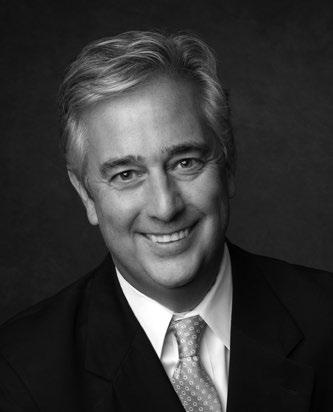
MAKING COFFEE
Today is a big day. It’s a big day for our client. It’s 6:20 a.m. and I’m making coffee before I shower and get ready for a mediation in a tragic and complicated case. The stakes could not be higher. The emotions of responsibility, loss, and tragedy fall like a blanket on us all, including my very capable co-counsel, my father. I’m making my way to the coffee maker. My mind is racing with the weight of the day.
As the coffee drips, I’m drawn to two photos on my refrigerator. One is a photo of me and my whole crew in the driveway when my kids were little. My hair is dark, the four kids are still kids, and our two golden retrievers, now on the other side of the rainbow bridge, are looking into the lens. My wife is the only one who hasn’t changed. The photo reflects a time of pure chaos and… great happiness. Today, the house is quiet. The kids are all grown and boringly selfsufficient. They are spread out across the country, happy and leading productive lives. The drama is of a different nature, but I sure do miss the chaos, the house full of voices. The other photo is of Juju. She smiles at me while I’m making coffee.
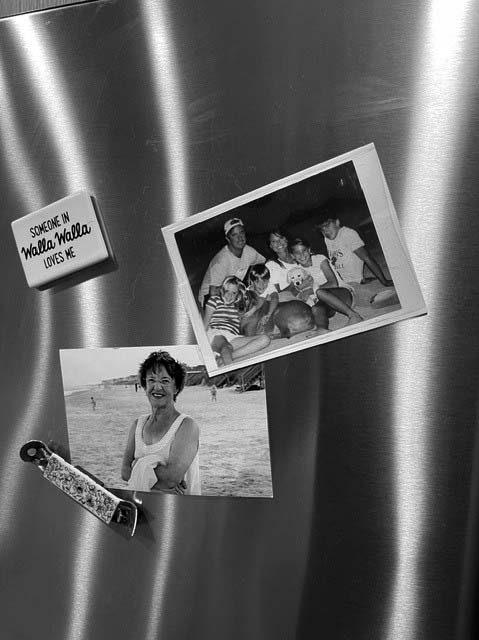
Juju was my motherin-law. We lost her to Alzheimer’s Disease in 2020. The photo was taken ten years earlier, just before the lights started to dim. It would take an entire decade to completely extinguish that level of light, and the photo captures her at her best and in her favorite place - the beach. She loved the family beach trip. What became an extended family beach trip started as a girls’ trip with her daughters - Dori, Nancy (my wife), and Jill. It became an annual trip that includes their brother, Andy, spouses, all of our kids, the patriarch (Nancy’s father) and, this past year, the two great-grandchildren she never met. This year will be the 23rd year. We’ll need two houses for the 24 people who will attend. She is missed. Juju attended several years after her diagnosis - probably a couple of years when it didn’t make practical sense. But what is practicality when it comes to such things? We broke her out of assisted living when she attended for the last time. For months she had asked, “When is our beach trip?” She would ask the question several times a week. If you ask me, the idea of the trip was one of the things that kept her alive. There was a moment on that last trip, when she was in the depths of the disease, where she sat singing along to her playlist, feet in the sand. As she looked out over the Gulf of Mexico, surrounded by family, she asked “When is our beach trip?” Hilarious and heartbreaking. So it is with Alzheimer’s. Mine is the family who searches for the levity even when it cannot be found.
Last year, my wife’s sister gave her the photo that stares back at me. I think I last saw it at the funeral. It is simply one of those photographs
that catches the essence of a person. I don’t remember the day it went on the refrigerator. I don’t know how long either photo had been there, because I wasn’t paying attention. Are you?
The day I finally noticed started like today - with a checklist, with worry. The concerns that come with a full-time law practice flood into my mind when I wake. Routine is routine. You know what I’m talking about - thoughts of the day’s clients, deadlines, and concerns with law office machinations. Today, it is the very future of a child that has taken up residence in my head. We have to check boxes to sleep and then get up and do it all again. But as I approach this morning I am deliberately looking for her. She never disappoints. Every morning’s greeting from Juju causes me to pause and to hear the words of a poem my daughter wrote.
“The Poem,” written by Cori when she was 15 years old and at a time Juju was beginning to show the signs we all tried to deny, is about the grandchildren spending the night with Juju when they were little. Like the photo, it captures her very essence.
At JuJu’s
The popsicles were waiting to be made
And eaten once on the porch Songs to be sung with you while
Swinging on the swing
Your pennies would be in their jars
For us to dump out
The dress-up in its box to be worn
The shows for us to perform for you
To make you smile and ask for more
You would prepare your spaghetti
And give us the specific cups we wanted Put us in bed and rub our backs
And with that last second
Before we reach sleep
You’d whisper “I love you”
So that your love may be the last thing we hear
Ten years after writing it, Cori read it at Judy Ackermann’s funeral. The memory, the photo, and the poem ground me. The legacy of Judy’s simplicity and singular focus on family and love is a good way to start this or any other day.
Now, it is time to leave this reflection and hit send. Time to get to work. The coffee maker is beeping, and I take one last look at her neverending smile.
It is easier for some than others, but I find that in these moments I need to be very deliberate in my attention to the simple and sublime. The refrigerator has become a constant for me, a bit of a North Star, like coffee, looping my belt through the loops, or putting on socks. I pour the first cup and march onward, my last important thought before the task at hand coming in the form of a hope that one day I might be a photo on someone’s refrigerator, fortifying a loved one against the tasks of the day.
DICTA March 2024 23

HOW TO THRIVE IN LAW AND LIFE
By: Emily Heird, LPC/MHSP Vantage View Coaching
WELL-BEING STRATEGIES TO BOOST MOOD AND REDUCE DEPRESSION
We made it through experiencing a taste of true winter this January of 2024. It will be one we all remember. People can more easily fall into low mood states in the winter, but one can experience depression any time of the year. Lawyer well-being surveys routinely reflect that about 20-30% of lawyers experience depression – at higher rates than the general population. If you are one of them, or you are a lawyer who has periods of lower mood and motivation, there are strategies and practices you can implement to reduce and overcome depression.
Sustainable high-performance as a lawyer requires having an elite mindset dialed in to work for you, not against you. Depression works against you in many ways (productivity, efficiency, motivation, cognitive processing speed, and impaired decision-making, to name a few). However, it is not possible to think your way out of depression. It’s not possible to tell yourself to “just be happy” and then feel happy (if only it were that easy!). The constant stream of negative thoughts is the depression talking. Mindset work is not the go-to strategy here. Taking action must be the first step to change the brain chemistry. Then, the negative chatter will be quieter, and you can work on mindset. The challenge with depression is you often don’t feel like doing anything. You need to deploy a strategy called “opposite action.” Make the decision to do an opposite action (e.g., go on a walk when you feel like lying in bed) logically knowing that you will feel better after the action. It can be challenging to do when you are very low on energy. Start small and build.
circadian rhythm, which is connected to sleep. Lack of sleep increases negative thinking.
3. Put into action strategies every single day, throughout the day, to release stress in healthy ways. Practicing law is inherently stressful, but you cannot succumb to the stress. Professional athletes focus on rest and recovery more than training. Treat yourself the same, too. Incorporate intelligent recovery breaks throughout your day instead of working 8-10 hours straight through without breaks. Basketball coaches will take timeouts when they notice the players are getting fatigued. This is strategic to give them a recovery break so they can recharge energy for another spurt of intense play. Follow their lead. Find healthy outlets for stress.

4. Limit alcohol. Often it can be easy to reach for a drink to release stress or to numb when you’re feeling down. But alcohol, as a drug, is a depressant. It causes low moods and depression. Refer to my previous articles to learn about how alcohol affects you and strategies to change your relationship with alcohol.
Here are six strategies to reduce depression and elevate mood.
1. Boost your social connections and relationships. Research shows this is the number one factor tied to our overall well-being. Loneliness is an epidemic in this country, and lawyers report high levels of loneliness. There is tremendous pressure to be perfect as a lawyer and this is carried into the personal domain. In addition, when you are in your Lawyer Role (“Performer Self”), the focus is on the work and the clients – not on you. Because no one is perfect, it can be a coping mechanism to isolate so people don’t “find out” you aren’t perfect. Even if you are spending time around people, it can be easy to put on the mask that you have it all together and not share your “Real Self.” Your biological need to feel genuinely accepted will not be met, leading to loneliness – a symptom of depression. Schedule time in your calendar with good friends and loved ones. Make new friends. Engage in micro moments of positivity resonance (e.g., chat with a cashier, laugh with a colleague). Give and receive hugs from your family (or pets!).
2. View sunlight every day in the morning and in the evening. Dr. Andrew Huberman has done extensive research on the effects of sunlight and mental health. Your body produces Vitamin D from sunlight and low levels of Vitamin D are associated with increased symptoms of depression and anxiety. Sunlight in the morning and evening help to regulate
5. Regulate your nervous system. All too often the fight-or-flight nervous system is activated as a lawyer. You are in a high state of (dis) stress. This not only drains your physical and mental energy but keeps you operating in a state of fear. Humans are designed to withstand short, intense bursts of high stress, but not ongoing, chronic high stress. This can cause your nervous system to malfunction, which leads to physical health issues impacting the cardiovascular and hormonal systems. Overworked nervous systems also impair sleep, increase fatigue, and lead to general mental unrest – all symptoms of depression. Breathwork practices help you flip the fight-or-flight switch “off” throughout the day. Bonus: when you are not in fight-or-flight, your cognitive processing speed increases, making your work more efficient.
6. Another important reason to regulate your nervous system is related to pessimistic thinking. Lawyers tend to be skeptical in nature before law school. Law school only trains the skepticism muscle to strengthen, which is a superpower while working cases. But if you keep the Lawyer Brain on all the time, you start to see the whole world through a pessimistic lens. Negative thinking and catastrophizing lead to feelings of hopelessness and powerlessness, hallmarks of depression.
Without getting into the science of it here, research shows when the brain and body are in a state of fight-or-flight, it is impossible to think realistically or optimistically. To access an optimistic or realistic mindset (ideal and necessary for sustainable success in high-stress, high-demand professions), your nervous system must be regulated.
I’ve also written previously about the correlation between diet and depression. The foods you eat impact your mental health. What will you try from this list? And remember: If you are struggling with depression, you are not alone, and there are many professionals who can help.
24 March 2024 DICTA
MANAGEMENT COUNSEL: LAW PRACTICE 101
By: Stephanie D. Coleman Owings, Wilson & Coleman
REVISITING CRAVATH
Throughout my legal career, I’ve been struck again and again by the wide variety of experiences which all comprise the practice of law. Some attorneys are drawn into the legal profession with visions of a fulfilling life as a small-town lawyer. They imagine practicing solo or with a partner and walking to lunch each day with friends and colleagues. Other attorneys pursue fast-paced careers in large firms with nationally recognized clients and dramatic impacts. Still others work directly for their clients in an in-house corporate setting or as government attorneys.
But though the size may vary, the basic structure of a private civil law firm has changed little since its foundational development by an attorney named Paul Cravath at the beginning of the 20th century.1 The concepts of hiring graduates and newer attorneys as associates, paying them a salary, and training them up with gradually increasing amounts of responsibility can all be attributed to Cravath.2 He is also responsible for the principle that, after an appropriate amount of time, these associates should have proven they are ready to make partner or be shown the door.3 His structure had the benefit of stability and mentorship for new attorneys, which had not previously been the norm. But it also fed into overwork as attorneys tried to prove themselves and drove the class-like distinctions between partners and associates we still see today.
As life constantly moves, even the practice of law is searching for new ways to conquer challenges such as succession planning; work-life balance; professional mobility, whether upward or geographically; and personnel shortages. As comfortable as the traditional firm model is, with partners, associates, paralegals, and administrative staff, it can be beneficial to review some of the more unique structures being utilized today in private practice around the world.
So how, exactly, can a traditional civil practice law firm create a rising-tide environment for all attorneys while providing its lawyers and practice both flexibility and stability? One legal group in Canada, Delegatus Legal Services Inc., is using a modified firm model to service its clients in an effort to reach these goals.4 Though the corporate entity has three shareholders, there are no partners, associates, or similar distinctions within the business.5 All licensed attorneys perform services for the corporation as independent contractors. Compensation is paid on a percentage basis of personal revenue, calculated based on factors such as hours worked and generation of business, not “status.”
The primary purpose of the model is to allow each attorney to have complete control over his or her workload.6 The more an attorney works, the more he or she will earn, but without the value judgment that working more is fundamentally better. The model theoretically reduces
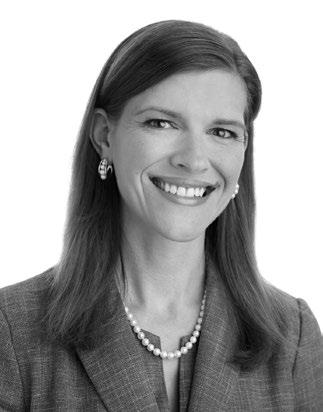
tensions between attorneys in the company because no one group of attorneys is incentivized to overwork another group of attorneys for personal benefit. Conversely, every attorney in the group is reduced to the revenue he or she can generate in a finite amount of hours each year, which introduces limited earning potential and volatility for each participant.
So how can a firm solve these problems? For a long time, attorneys tried to solve the limited earning potential by simply using more and more of their finite time toward work and billing. If all you have to sell is time, you have to steal it from other places in your life to sell it to someone else. But another legal company, Exemplar Law, LLC, is working to use different strategies to try to solve these problems. First, Exemplar’s model completely eliminated the billable hour.7 Instead, Exemplar bases all legal fees on value added to the client rather than time spent.8 This creates an opportunity for an attorney to create more valuable products in less time and actually benefit from the efficiency instead of being penalized for it.
Concerning the issue of volatility, Exemplar uses a unique take on diversification. Exemplar Law, LLC, works with other companies, including an accounting firm and a brokerage group, as a “closely integrated family of companies,” to provide a range of offerings that go beyond mere legal advice.9 The separate companies help the professionals navigate rules related to ownership of law practices, and the availability of built in tax, accounting, finance, and business professionals allows the firm to participate in providing a broader range of services to more types of clients than it could do alone.
Regardless of what your practice looks like, it can be a challenge sometimes to envision it any other way. But sometimes what we lack in creativity, we can make up for by being observant of other areas of the law or even other industries. It may not require wholesale changes to your operations, but you might be surprised to find small ways to improve your practice.
1 Oller, J. (2019). White Shoe: How a New Breed of Wall Street Lawyers Changed Big Business and the American Century. Dutton.
2 Id.
3 Id.
4 Joan C. Williams, Aaron Platt, and Jessica Lee, Disruptive Innovation: New Models of Legal Practice, 67 Hastings L.J.1 (2015). Available at: http://repository. uchastings.edu/faculty_scholarship/1279
5 Id.
6 Id.
7 Id.
8 While this billing model is not exactly the norm in business or defense practices, it is reminiscent of contingency billing which determines the value of the service in direct relationship to the value provided to the client.
9 Williams, supra n. 4.
About this column: “The cobbler’s children have no shoes.” This old expression refers to the fact that a busy cobbler will be so busy making shoes for his customers that he has no time to make some for his own children. This syndrome can also apply to lawyers who are so busy providing good service to their clients that they neglect management issues in their own offices. The goal of this column is to provide timely information on management issues. If you have an idea for a future column, please contact Sam Henninger at shenninger@wmbac.com.
DICTA March 2024 25
AROUND THE BAR, continued from page 9
or another to be a witness for something so limited as to how to define certain TennCare terminology to explaining that not all TennCare estate recovery claims are appropriate or enforceable.
Our firm’s policy is to limit each attorney to 5 new client appointments per week. We cannot take more new clients than that and still serve the clients already needing our attention. The only exception to this rule is if there is a situation that has put a senior or a person with a disability at risk of some type of immediate harm. In recent years, the word “pivot” has driven me crazy, but we do that a lot here.
Myth: I can’t afford to go “all in” for Elder Law, but I’ll build up that practice on the side of the other stuff I can do.
This is the one myth that we really wish could be true. Achieving certified status is a pain. It can actually seem that a wall has been built just to stand in your way. Anyone who wants to become a CELA is entitled to know that this “wall” requires continuing time commitments, is expensive to achieve, and is ongoing, requiring re-certification every five years to remain a CELA. And, with so few certified Elder Law Attorneys in the U.S., mentors are not usually someone you’ll meet at your next bar association meeting.
But this is how it can work – and work GREAT!
Recognizing that seniors truly are a unique type of client, the University of Tennessee College of Law approached me about becoming the adjunct professor of Elder Law. I jumped at the chance because here was an opportunity to bring on board the next generation of Elder Law practitioners. My class was capped at 16 students, and I hope it was beneficial to every student who took it. (Those students were in their mid-twenties with little knowledge of the difference between Medicare and Medicaid, but they had parents and grandparents who were always
Propel your goals with precision.
interested in what they learned in class that day!)
The best move going forward? Create your own space in the law firm where you want to practice. The exact advice I gave to my students:
Find the law firm that you really admire and want to work with. Point out to them that they do not have an attorney who is a specialist in Elder Law. Tell them that you want to be their Elder Law attorney. If they will take you seriously, then you will take this commitment seriously. If the firm will pay your dues to NAELA and NELF, pay for CLE courses and study courses--even if located across the country--and pay for your efforts to pass the certification exam, you will bring income to the firm and provide a service to the generation needing CELAs the most, justifying the time and expense invested to become certified.
Okay, I’ll pull away the screen a bit to say that, “Yes, some days suck.” But some days are glorious. And there is no more fulfilling way to practice law than to represent seniors and persons with a disability.
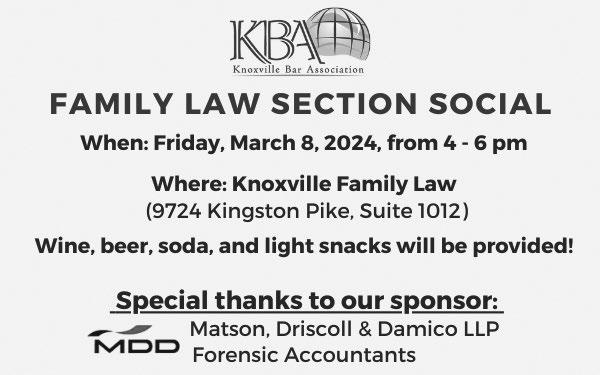

You know where you want to go. We know how to get you there. Our team offers tailored and clear guidance with solutions that will create a direct path to help you successfully reach your financial goals. Because we’re a sound financial institution with deep roots and a focus on relationships, you can feel confident that your financial future is our top priority.
Reach out to learn more: knoxbarassociation@firsthorizon.com
26 March 2024 DICTA
©2023 First Horizon Bank. Member FDIC.
By: Parker Bohne
Duncan School of Law
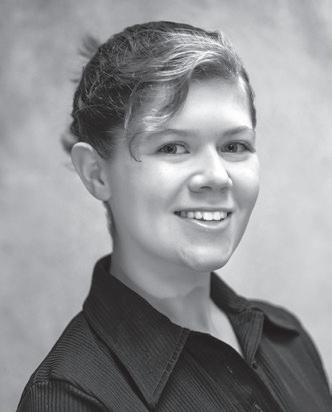
ALLIANCE BREWING COMPANY
As you’re driving down Sevier Avenue, you can’t miss the massive sculpture of a cyclist signaling your arrival at South Knoxville’s hidden brewery treasure. Born and built in 2015, Alliance Brewing Company has made a name for itself by diving headfirst into the culture and community unique to South Knoxville.
The Atmosphere
Stepping into Alliance feels like entering a green oasis, with indoor plants adorning every corner and creating a refreshing atmosphere. The relaxed, neighborhood vibe immediately puts visitors at ease, making it a perfect spot for locals and newcomers to unwind. Located only five minutes from Ijams Nature Center and situated on a popular bike route, Alliance effortlessly becomes a hub for cyclists and adventurers seeking a well-deserved break. However, the activities don’t stop once you get to Alliance, as the brewery offers a variety of activities from bingo to yoga. Alliance offers a haven for both adventure-seekers and beer aficionados alike.
diverse tastes. In summary, with its impressive tap lineup, welcoming taproom, and commitment to variety, this brewery is a haven for those looking to explore and savor exceptional craft beers.

The staff adds to the welcoming ambiance with their kindness and approachability, creating an inviting space for patrons to feel at home. Inside, smaller and intimate tables provide a cozy setting for friends to gather, while a wall of windows facing the patio allows for a seamless transition between indoor and outdoor spaces. The outside patio, adorned with string lights, features a fire pit, wooden lounge chairs, and large picnic-style tables, offering ample space for socializing or enjoying a peaceful evening under the stars. Whether you’re cheering on your favorite sports team indoors or basking in the open air outside, this brewery strikes a perfect balance between intimate and communal, making it a must-visit for those seeking a laid-back and enjoyable atmosphere.
The Brews
Alliance truly stands out with its impressive lineup of twelve rotating taps, brewed right behind the counter where they’re purchased, showcasing an array of flavors that cater to every palate. The commitment to always introducing new flavors keeps patrons excited and coming back for more. On the other hand, if you’re a creature of habit, Alliance will take care of you as well with classic brews like the Cubano Coffee Brown and CMS IPA, added to the menu on May 25, 2016, and November 6, 2017, respectively. The worst (or best) part about going to Alliance is having to decide between trying one of their new, guaranteed-tobe-delicious brews, or sticking with your tried-and-true favorites. The options to sample tasters or opt for a flight are a perfect solution, making decision-making a breeze and allowing patrons to find their perfect fit.
For those seeking refreshment after a day on the trails or relaxation after a long day at work, this brewery has you covered with a variety of beer styles, from crisp pilsners to smooth brown ales. The seasonal flavors add an extra layer of excitement, ensuring there’s always something new to try. The extensive selection doesn’t stop at traditional beers; the inclusion of canned ciders and sodas adds a delightful twist to the offerings. Additionally, the Taproom Seltzer collection with ever-evolving flavors is a testament to the brewery’s innovation and ability to cater to
The Food
While Alliance may not have its own food menu, its strategic location ensures that patrons won’t go hungry. The occasional food trucks parked outside offer a diverse range of culinary delights to complement the brewery experience. Additionally, Alliance has no issue with its customers ordering togo food from any one of the locally owned restaurants located just a hop, skip, and a jump across the street. South Coast Pizza provides a tempting option for those craving hot, delicious slices of handmade pizza. For those in the mood for Chinese and Cambodian flavors, the Landing House is a go-to spot, while Angry Dumplings Tea offers tantalizing Asian fusion. The brewery’s integration with the vibrant food scene in the vicinity adds a unique dimension to the overall experience, allowing visitors to pair their craft beer selections with a variety of delectable dining options just steps away.


DICTA March 2024 27
DECISIS New Features 2024 FREE for KBA members A fast, reliable legal research tool a $1,200 value! www.knoxbar.org/Decisis MORE THAN 4.2 MILLION CASES FROM NEW COURTS NOW AVAILABLE! Decisis is FREE with your KBA membership ($1,200 value). With an easy-touse Google-like interface, Decisis offers tailored search filters designed to pull highly relevant results from its database. Enhanced customer support is available seven days a week for both research assistance and technical help. Bankruptcy Reform Act Internal Revenue Services Rulings Internal Revenue Bulletins FCC Decisions Federal Energy Regulatory Commission Decisions National Labor Relations Board Decisions (NLRB) National Transportation Safety Board Decisions DOE Office of Hearings and Appeals Decisions All 50 State’s Trial Court Cases
LEGAL LIBATIONS: KNOXVILLE BREW REVIEW
LMU
J.D. Candidate, 2026
BENCH AND BAR IN THE NEWS
How to place an announcement: If you are a KBA member in good standing and you’ve moved, have property to rent, or received an award, we’d like to hear from you. Talks, speeches (unless they are of international stature), CLE promotions and political announcements are not accepted. Notices must be submitted in writing and limited to 100 words. They are printed at no cost to members and are subject to editing. Email your notice to membership@knoxbar.org.
KBA MEMBERSHIP RENEWAL
KBA is successful wholly because of your support and involvement. If you’ve already renewed, thank you! If you haven’t yet, there’s still time. You can renew your KBA Membership by clicking on “Membership Renewal” within your myKBA profile. It is the last item listed under your name. We encourage you to pay online and update your profile. To see which committees and sections you are affiliated with, click on the “My E-Communities” tab under your myKBA profile. We are excited about new programs, continuing education offerings, and networking opportunities on the horizon in 2024.
KBA MEMBER SHOUT OUTS
As part of this year’s focus on celebrating our bar association’s diverse membership and exploring creative ways for members to connect, network, and experience fulfillment in the practice of law, we would like to highlight the accomplishments and contributions of KBA members who are making a difference in the legal arena and beyond. Send links to news to posts or articles, pictures, or just a blurb about what’s going on to membership@knoxbar.org.
FREE CLASSIFIEDS AVAILABLE
Did you know the Classified section on the KBA website allows you to add your resume if you are looking for a job or if you need to hire someone, you can post a job and search for candidates? Click on Public Resources and select “Career Classifieds” from the dropdown navigation. The Classifieds receive in excess of 8,000 page views each month so if you are looking for a job or a new position, make sure to check out this valuable resource.
LEGAL HISTORY VIDEOS AVAILABLE
In 2012, the KBA’s Archives Committee began interviewing senior members of the local legal community to capture their stories and perspectives on life and the practice of law. With funding provided by the Knoxville Bar Foundation, the KBA has been able to preserve this history for future generations of lawyers and other interested persons. It is important not to forget the contributions of those who built the local bar and sharing milestones and stories of great lawyers and judges provides new lawyers with historical perspective and inspiration. Interviews of Tim Priest, Bob Pryor, and Charles Swanson have been recently added. View the interviews online at www.knoxbar.org by clicking Member Resources and then Practice Resources.
OFFICE SPACE AVAILABLE:
• North Knoxville, right off I-640/275. Part of a larger office with an established attorney. Free Parking and Internet, access to Kitchen and Conference room. Separate entrance. Excellent set-up for a new attorney. $500 per month. Contact Daniel Kidd, dan@ danielkiddlawoffice.com.
• First class furnished individual offices for rent on the 19th floor right off the elevator in First Horizon Plaza, 800 S. Gay Street. Please contact Lance Baker at 865-310-0997 for further details if you are interested.
• Downtown Office Space for Rent - Large corner office with a view of downtown. Located in the First Horizon Building. $900 monthly. Inquiries can be sent to jfanduzz@gmail.com.
DICTA Correction
The phone number for Esther L. Roberts, Judicial Law Clerk to the Knox County General Sessions Judges, was listed incorrectly on page 6 of the February DICTA. The Practice Tips article on Knox County General Sessions Court should reflect Ms. Roberts’ telephone number as 865-215-2146.
Address Changes
Please note the following changes in your KBA Attorneys’ Directory and other office records:
Melissa B. Carrasco
BPR #: 029094
Carrasco Law Group 3320 Johnson Road Knoxville, TN 37931-3527
Ph: (865) 343-7844 melissa@carrascolawgroup.com
Michelle Morales-Cruz
BPR #: 038844
Law Office of Rachel Bonano, PLLC 10700 Virginia Pine Way, Suite 203 Knoxville, TN 37932-1918
Ph: (865) 282-5309 mmorales@bonanolaw.com
Todd L. Fulks
BPR #: 021479
Red Stag Fulfillment 2042 Town Center Blvd., PMB #349 Knoxville, TN 37922-6677
Ph: (800) 815-7524 x126
todd.fulks@redstagfulfillment.com
Brennan P. Lenihan
BPR #: 022165
Baker, Foster, Potter, P.C. 10 Emory Pl. Knoxville, TN 37917-7317
Ph: (865) 963-3052 b.lenihan@bfplawfirm.com
Abigail G. Patterson
BPR #: 030162
Dollar General Corporation 96 Rolling Links Blvd. Oak Ridge, TN 37830-9023
Ph: (615) 855-5559 algoins1@gmail.com

28 March 2024 DICTA
WELL READ
By: R. Culver Schmid Baker, Donelson, Bearman, Caldwell & Berkowitz, P.C.
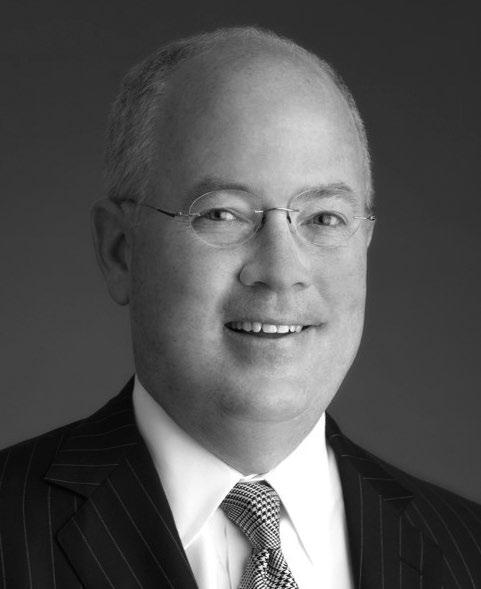
TWILIGHT OF DEMOCRACY: THE SEDUCTIVE LURE OF AUTHORITARIANISM,
BY ANNE APPLEBAUM
Anne Applebaum is a Pulitzer Prize winning author and staff writer at The Atlantic who has written extensively about Eastern Europe. Her 2020 book Twilight of Democracy is subtitled: “The Seductive Lure of Authoritarianism.” She begins her story in 1989 in Poland when she, her Polish politician husband, and a gathering of friends celebrated the victory of democracy over communism with the collapse of the Soviet Union. Democracy was at its pinnacle.
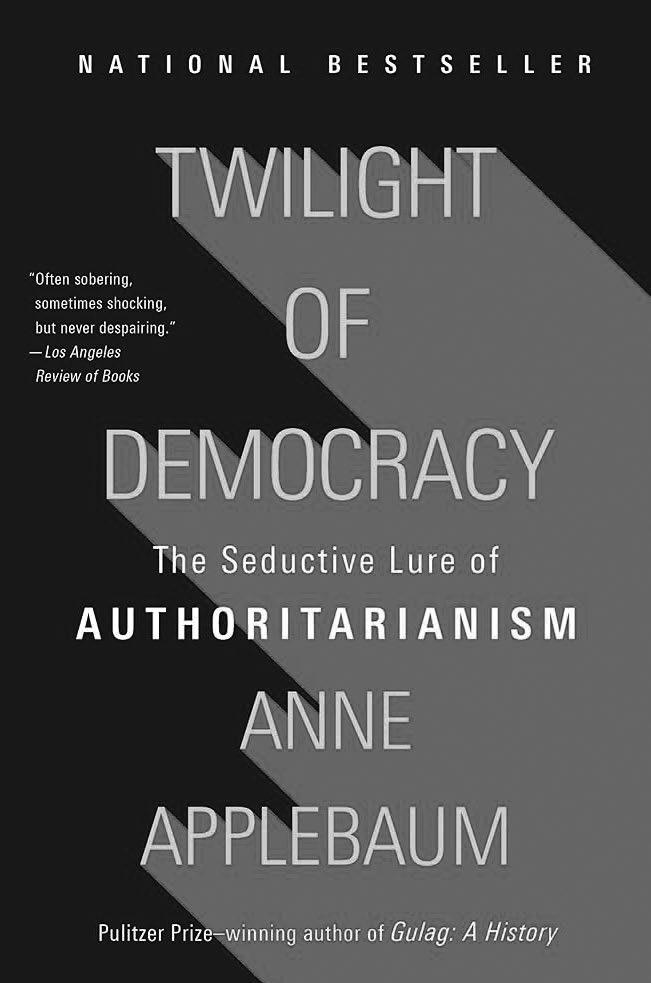
Applebaum traces the next 30 years from the height of democracy to the current threat of authoritarianism, not just in Eastern Europe but now in the western democracies, including the United States. She establishes this theme: “Given the right conditions, any society can turn against democracy. Indeed, if history is anything to go by, all our societies eventually will.” Throughout her book, Applebaum describes when authoritarianism arose in history, the characteristics of authoritarianism, how it came to exist in societies, and how the founders of our country feared and protected against it. Drawing from experiences with friends and peers, she examines why individuals became partisans in the effort to displace democracy. She asks whether democracy has fallen from its zenith in 1989 until now when it appears in its twilight phase. She leaves the reader with the question as to whether our society will allow this deterioration of democracy to continue or whether we will revitalize and restore it.
Applebaum defines the red flag warnings which portend the rise of authoritarianism predispositions within our societies. Authoritarians and their supporters are predisposed to favor homogeneity and order and cannot tolerate complexity, pluralism, and fierce debates. Authoritarianism is a frame of mind, not a set of ideas. The common denominators of autocracies include promoting hyperbolic nativism, pushing restorative nostalgia, attacking the free press, challenging the rule of law and judicial system, and promoting government run by political party hacks instead of qualified civil servants. Authoritarians support a focused effort to wreck the cultural institutions which have stood as pillars upholding free society.
Though autocracies often form around a central cult-like leader, Applebaum describes how no authoritarian can succeed without partisans to promote the cult and help launch the coup. These people, whom Applebaum identifies as clercs (or in the English translation clerks), are the professionals, writers, and otherwise well-educated and successful individuals who morph into political entrepreneurs and propagandists slowly dismantling democracy with illiberalism, clearing a path for personal aggrandizement and political power. Applebaum describes her personal ex-
perience from 1989 as she watches the transformation of her friends into men and women who sought to overthrow, bypass, or undermine existing institutions in their lust for power or fame. These clerks seek to redefine their nations by rewriting social contracts to alter the rules of democracy so that these partisans never lose power. Applebaum describes how our nation’s founders anticipated these individuals by installing checks and balances to manage the proclivities of men and women towards autocratic self-aggrandizement of power.
These clercs seek to make government more partisan and the courts more pliable. Often, they are beholden to cult-like figures. Authoritarians carry out these illiberal tasks usually without a strong mandate from the voting public. They create existential enemies to justify breaking the law and attacking cultural institutions. The existential enemies are often Jews, immigrants, unfavored religions, homosexuals, and anyone else who can be spun into a conspiracy theory regardless of its basis in truth. By scaring the people with these unsubstantiated demonic figures, the authoritarian tries to convince people that the end result of saving the country, or a way of life, overshadows the need to follow long held rules of law and due process procedures. This alternate reality turns on its head hundreds of years of democratic institutions and processes designed to hold back these extremes. In the United States, this same group considers democracy worthless, believes that elections cannot bring real change, and accepts as true that only the most extreme and desperate actions can stop the decline of a certain vision of America.
Applebaum ends her short book asking whether we are in the twilight of democracy where rational debate is impossible, where confidence in institutions is lacking, and where the liberal western thought of searching for truth is no longer acknowledged or implemented. Applebaum’s conclusion is that no political victory is permanent or otherwise guaranteed to last. Liberal democracies demand responsible behavior from its citizens such as legitimate argument, communal effort, and personal initiative. The questions confronting the United States today are whether we are too lazy to save ourselves from ourselves and whether we can reengage to save the political system that has created the exceptionalism of this country. Was Benjamin Franklin correct when he supposedly commented, after approval of the United States Constitution, that we have created a republic if the people can keep it? Applebaum tells us now is the time to fight to keep it.
DICTA March 2024 29
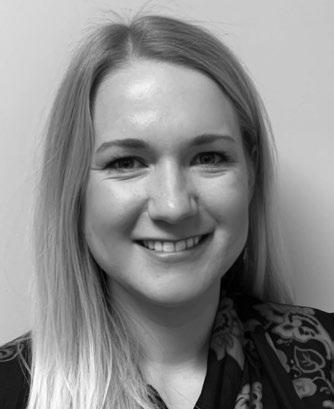 By: Caitlin A. Torney Director of Pro Bono Legal Aid of East Tennessee
By: Caitlin A. Torney Director of Pro Bono Legal Aid of East Tennessee
THE CASES WE PLACE
Last month’s DICTA column provided a primer on the benefits to attorneys taking pro bono cases through the Pro Bono Project. In this month’s column, I will focus on the types of cases we place with volunteer attorneys for full representation and provide some examples of cases we are actively trying to match.
All cases placed for pro bono representation through the Pro Bono Project in Knoxville must conform to the requirements of Legal Aid of East Tennessee’s (LAET) primary funder, the Legal Services Corporation (LSC). Clients must meet income eligibility guidelines, be citizens or legal residents of the United States, and reside in one of the four counties our service area covers: Sevier, Loudon, Blount, or Knox. We also encourage attorneys to “reverse refer” cases they have agreed to take pro bono and believe may meet these requirements. This ensures you will get CLE credit for the time you spend on the case, qualifies you for support from LAET staff, and helps LAET continue to provide services in our area.
We are always excited to welcome new attorneys willing to volunteer their time and expertise. We provide training materials, sample pleadings, client support, and mentorship. If you are interested in any of the cases outlined below or would like to volunteer to be contacted for certain types of cases, please email me at ctorney@laet.org or call me at (865) 251-4951. You can also go to our website https://www.laet.org/pro-bonomatters/ to browse an updated list of available cases!
1. Conservatorships: We only take uncontested conservatorships. Prior to matching the case for representation, we require clients to provide a doctor’s note that certifies a conservatorship is appropriate. If needed, we can recruit a pro bono Guardian Ad Litem to assist. Most of our clients are seeking conservatorship over an elderly person no longer able to care for themselves or a child who is about to turn 18 but is unable to manage their own affairs. For example, we are currently seeking a volunteer attorney to assist a Spanish speaking Loudon County woman in obtaining a conservatorship over her developmentally disabled sister.
2. Adoption: We only place uncontested adoptions. Prior to placement, we require proof to ensure that the parties involved have agreed to an adoption. Right now, we need an attorney volunteer to represent a Knox County woman seeking to adopt the teenage cousin she has long cared for, and both biological parents are in full agreement. She has had custody of her cousin since he was four years old, and she reports he’s increasingly vocal in his desire to make their relationship “official.”
3. Name Changes: Uncontested name changes for minors, and name changes for the occasional adult needing extra assistance, will be placed for full representation.For example, a client in Blount County needs legal guidance to navigate a conflict between different agencies to complete her name change procedure.
4. Bankruptcy: We place these cases quarterly through our Debt Relief Clinic held Saturdays at the Public Defender’s Community Law Office. So many clients are able to get a fresh start through this clinic, and we need new attorney volunteers to help meet the demand.
5. Estate planning: We always have clients we are unable to help in-house who need professional help with estate planning to draft powers of attorney, advance directives, and simple wills. Occasionally we will also place clients seeking help establishing a special needs trust. To streamline the process, we require clients to complete an information packet prior to placement to indicate their preferences, identify their assets, and designate their beneficiaries.
6. Probate: Our program matches only uncontested probate cases. Many of these cases can be placed as advice only, where a client would like the opportunity to discuss a case with an attorney but does not require representation. We particularly need attorneys willing to help in Blount and Sevier County.
7. Expungements: Clients who have served their time and would like to move forward in life look to our program to help them expunge their record. A relatively simple procedure can make a huge difference for a person as they seek to move forward. Although we place most cases in Knox County through area clinics, clients needing help with records in the surrounding counties are placed for full representation. We have partnered with the KBA to offer the Second Chance Initiative, and free training is available to volunteers willing to take a case or volunteer at a clinic.
8. Driver’s license reinstatement: So many clients are looking to reinstate their driving privileges. We particularly need help with cases in Blount, Loudon, and Sevier counties. These cases are usually straightforward, and a small amount of time can make a huge difference in an individual’s life.
9. Miscellaneous: We occasionally get cases that do not fit in any of the categories listed above, like landlord/tenant cases, contract disputes, and wage issues. A great way to learn about these cases is to check our website!
30 March 2024 DICTA
Serving the Legal Community in Assisting Low-Income Persons To Navigate the Justice System PRO BONO SPOTLIGHT
Upcoming Clinic Opportunities Virtual Pro Se Name Change Clinic: Zoom. Thursday, April 11 3PM-5PM. Email ctorney@laet.org. Legal Advice Clinic for Veterans: In person at the Public Defender’s Community Law Office at 1101 Liberty Street in Knoxville. Phone advice options available. Signup via the KBA website. • NOTE: The clinic will be held bimonthly in 2024. • Wednesday, April 10 Noon – 2:00 PM. • Wednesday, June 12 Noon – 2:00 PM Debt Relief Clinic: In person at the Public Defender’s Community Law Office at 1101 Liberty Street in Knoxville. Signup via the KBA website. • Saturday, May 4 9:00 AM – Noon Second Chance Initiative: Please keep an eye out for an in person expungement clinic sometime in July. Training will be offered in advance.
TELL ME A STORY
By: Grace G. Lovingood London & Amburn, P.C.
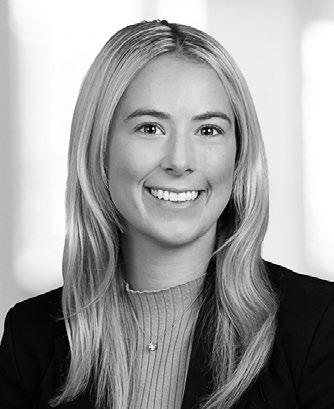
WHAT DO YOU DO?
When I was approached with the opportunity to write this column, my initial instinct was actually to decline. As an attorney still in my “rookie” year, what insight could I possibly have to contribute to the KBA community? I have little life and legal experience in comparison to most of my colleagues, many of whom have enough knowledge and anecdotes to fill a number of books, rather than just a single page. In pondering what I could discuss, I was a bit stuck because I felt as though the only appropriate topic to share would be something that is at least tangentially legal. But I am so much more than just an attorney, and the thousands of members of our local bar are so much more than just attorneys too, even if at times they feel as though it is all-encompassing.
If there is one thing that I have noticed about the law, it is that it can quickly consume us. Not one person who has successfully graduated from law school and gone on to pass the bar exam has escaped entirely unscathed. We have all succumbed to the pressure and genuinely believed at times that obtaining a certain ranking, getting a particular job, or being on the winning side of a case is the beall and end-all of not just our careers, but of our lives. Of course, these things are important, and ensuring that we give our best effort to our legal endeavors is a crucial part of the job. However, it has become quite clear to me that without creating appropriate boundaries, developing hobbies, and fostering relationships outside of the legal community, our careers can quickly become all of who we are, leaving little time or energy for dynamic personal development.
When we meet someone new, one of the first questions that we are asked, and are often guilty of asking, is “What do you do?” We all know to answer that question with our career: “I’m an attorney.” But I do a lot more than that, and so many of the attorneys I have met and have had the privilege of knowing do so many amazing things. Being a lawyer is one part of who I am, and while it is one of the most prevalent aspects of my life currently, it is certainly only a piece of me. I am also a wife, a soon-to-be mom, a daughter, a sister, a friend, a Vol, a runner, a
THE OATH, continued from page 13
12 Naval History and Heritage Command, Buchanan, Franklin, https://www. history.navy.mil/our-collections/photography/us-people/b/buchanan-franklin. html#:~:text=Franklin%20Buchanan%20was%20born%20in,extensive%20 and%20worldwide%20sea%20duty.
13 Sharp, supra n. 11.
14 Naval History and Heritage Command, John A. Dahlgren, https://www.history.navy. mil/browse-by-topic/people/historical-figures/john-a-dahlgren.html.
15 Id.
16 You can find a picture here: https://www.history.navy.mil/browse-by-topic/people/ historical-figures/john-a-dahlgren.html.
tennis player, a golfer (not necessarily a good golfer), a dog enthusiast, a fan of backpacking and snow skiing, and an enjoyer of the occasional mystery thriller novel. I work with people who enjoy fishing and boating, have a passion for painting and creating, spend free time growing crops, have a knack for woodworking, enjoy theater and the arts, and that only scratches the surface.
Lawyers get a bad rap— we are frequently maligned, and our reputations often precede us the moment we answer that unavoidable question of “What do you do?” However, the vast majority of men and women in our profession with whom I have had the privilege of interacting are interesting, considerate, cooperative, and full of integrity. It appears to me that many of the lawyers who do not fit the typical attorney stereotypes have been intentional about developing additional interests and pastimes. I really do think there is a valuable perspective and distance that is garnered when we separate what we do vocationally from who we are as people. With that being said, if there is one small piece of advice that has served me well in my three years of law school and in my short tenure as an attorney, it would be to never stop developing hobbies and passions, regardless of age. I am fond of an old saying which advises us that, “The best time to plant a tree was 20 years ago. The second best time is now.” It is never too early or too late to develop additional pastimes and pick up new interests. To the law student or lawyer who feels that their personhood has become too tightly intertwined with the legal profession, I would encourage you to try something new this month that has nothing to do with the law: sign up for a 5k and commit to training for it, take a tennis lesson, join a book club, register for a recreational sports team, sign up for a cooking class, volunteer your time at the local animal shelter, go for a hike in the Smoky Mountains—the options are endless! Perhaps you’ll develop a fresh perspective and garner a greater appreciation for all that you are capable of and all that our Knoxville community has to offer.
17 Sharp, supra n. 11.
18 Id.
19 Id.
20 Id.
DICTA March 2024 31

P.O. Box 2027 Knoxville, TN 37901 Prsrt Std US POSTAGE PAID KNOXVILLE, TN PERMIT NO. 309





























































 By: Caitlin A. Torney Director of Pro Bono Legal Aid of East Tennessee
By: Caitlin A. Torney Director of Pro Bono Legal Aid of East Tennessee

